
Table of Contents
Foundations of Psychoanalytic Thought (FOPT)
FOPT Year 1
FOPT Year 2
FOPT Year 2, 4:45 Courses
Psychodynamic Psychotherapy Training Program (PPTP)
PPTP Year 3
Adult Psychoanalytic (PsA) Program
PsA Year 3
PsA Year 4
PsA Year 5
Foundations of Psychoanalytic Thought (FOPT) Program
The Foundational Course entails one year of classes and provides a comprehensive framework for understanding psychoanalytic theory and its application to clinical work. The curriculum also includes monthly group supervision linked to class topics and Balint process group sessions, both of which are designed to help integrate didactic learning with clinical experience and to facilitate the use of self in our work.
The two-year Intensive Course provides further immersion in psychoanalytic theory and practice for students seeking to deepen what they learned in the Foundational Year or for experienced clinicians seeking to improve their practice of psychoanalytic therapy. Teaching is supplemented by group supervision that focuses on specific topics and case conferences that follow individual cases over several weeks.
Classes are held weekly on Tuesdays from 6:00pm to 9:00pm, beginning in September, at Rockland Mansion, E. Fairmount Park, 3810 Mt. Pleasant Drive, Philadelphia, PA 19121.
All class sessions are one hour and thirty minutes long. Specific class information (date, time, location, instructor) will be provided to students upon acceptance to the program.
FOPT Year 1
Course Title: Motivation
Instructor: Frank Tisano, LCSW
Start Date: 9/2/2025
End Date: 10/7/2025
No. of Sessions: 5
It takes more than a little chutzpah to teach a class on motivation. Motivation in our context is “human motivation.” And human motivation sounds a lot like “how should a person live?” or gasp: “what is the meaning of life”?
Searching after the meaning of life is what practically all novels and poems and films and artwork have puzzled about for the last several tens of thousands of years. And now, at 6pm on a Tuesday, in a matter of a few short hours…
We have precious little time. So, this won’t be a hyperrealistic portrait of human motivation. More like a gesture sketch to roughly get things in proportion.
It is really important to understand human motivation as a therapist. After all, it is what practically all patients come to us seeking help with.
It’s a tall order for us, but even if we succeed in uncovering what people really want in life, that only gets us partway there. It doesn’t tell us how we’ll get our patients to see and believe us. And it doesn’t tell us how our patients will get what they want, once they know what they want! These hows will be addressed in other types of classes, such as clinical technique and metapsychology (i.e. the structure of our minds).
The answer to human motivation is both straightforward, and dizzyingly varied and complex. That is because we all broadly want similar things (love, purpose, safety, health, fun), but everyone has their own design, their own motivational fingerprint.
I will try to distill all the thousands of years of art and culture into one sentence: Life is about feelings. And if we are to understand where patients are trying to head in life… we must follow the trail of their feelings. Feelings are to be our guide regarding the motivational fingerprint.
Course Title: Metapsychological Perspectives
Instructor: Salman Akhtar, MD
Start Date: 9/9/2025
End Date: 10/14/2025
No. of Sessions: 5
This 5-session course will delineate, define and describe the conceptual notions subsumed under the term ‘metapsychology’. Freud coined this term to designate a set of vertices that deconstructed mental phenomena and helped reveal their deeper meanings. There were 3 such vertices, which Freud referred to as ‘perspectives’. These were (1) The Topographic Perspective, (2) the Dynamic Perspective and (3) the Economic Perspective.
A little over four decades later Rapaport elaborated on the metapsychology in further detail and added many other perspectives, two of which are still widely recognized. These are (4) the Genetic Perspective and (5) the Adaptive perspective. The course being offered here will address these five perspectives and illustrate their theoretical basis as well as their clinical relevance.
Course Title: Balint Group
Instructor: Mark Moore, PhD (Cohort A); Geoffrey Margo, MD, PhD (Cohort B)
Start Date: 10/14/2025
End Date: 11/11/2025
No. of Sessions: 5
A Balint group is a group of clinicians who meet regularly and present clinical cases in order to better understand the clinician-patient relationship. The focus of the group is on enhancing the clinician’s ability to connect with and care for the patient.
A Balint group session begins with a member presenting a case for the group to discuss. The group learns about the patient through the presenter’s story, which includes not only the “facts” of the case but also the presenter’s reactions and responses to the patient. During the facilitated discussion the group members uncover different and new perceptions about the patient's and clinician’s feelings and their experiences with each other. Balint process groups serve to develop a new sensitivity to unconscious processes at work in the therapist-patient relationship, and the role of the facilitators is to help participants examine their experience of the case and also to wonder about the patient’s experience of the treatment.
This Balint group will have two leaders to facilitate the process. The success of a group depends on group members being honest, respectful, and supportive of divergent opinions. The group will meet approximately once every month and each student in the class will be encouraged to present a case at least once. The content of the group is confidential.
Course Title: Psychoanalytic Listening
Instructor: Ilene Dyller, PhD (Cohort A); Patricia Boguski, MA, LPC (Cohort B)
Start Date: 10/21/2025
End Date: 11/18/2025
No. of Sessions: 5
The purpose of this course is to introduce some central concepts and techniques of psychoanalytic listening with special attention paid to objective, subjective, empathic and intersubjective approaches. We will consider the advantages and limitations of each approach while applying such concepts both in and out of the clinical setting. Our first class provides an overview of each of these techniques. The following four classes will go over a relevant paper on a particular mode of listening, allowing us to explore the topic at a deeper level and also solidify our understanding of the topic. To facilitate our understanding, we will apply the main modes of listening to works of art as a way to practice listening analytically. We will also use this practical application as a means to constructively critique the particular mode of listening. I encourage students to first read the psychoanalytic paper for each week and then either watch, read, or listen to the work of art, coming up with some ideas of how the ideas presented in the essay might be used to understand the motivations (conscious and unconscious) of the central character(s) of the piece. As you feel more adept with the concepts being presented, I encourage everyone to apply what you learn to patient encounters and share what you come up with. The more discussion we are able to have the more we can all learn.
Course Title: Development: Infancy
Instructor: Barbara Shapiro, MD (Cohort A); Ya-Juan Zhang, BA (Cohort B)
Start Date: 11/18/2025
End Date: 12/16/2025
No. of Sessions: 5
The purpose of this course is to give you some knowledge and understanding about development in the first year. We will also discuss implications for working with older children, adolescents, and adults in the psychoanalytically based psychotherapies, including psychoanalysis.
Because this course is about infants and the modes of communicating with infants are largely non verbal, we will be viewing images on slides and videos as a major way of conveying material in a manner that involves the senses, and not just words and intellect. Participants will be able to describe and discuss various developmental processes in the first year of life, specifically those affecting the infant’s growing ability for: psychophysiologic regulation; the senses of self and self-with-other; intersubjectivity; and attunement. Participants will be able to describe the dyadic systems model; non-verbal communication; self and mutual regulation; mood states; the still face paradigm; and cross cultural differences, and begin to apply these concepts to their work with older children and adults. Participants will be able to describe problems that hinder infant development, such as the sequelae of early abuse and neglect, the impact of parental depression for infants, and one time severe trauma, and begin to apply this knowledge to clinical or real life situations.
Course Title: Object Relations
Instructor: Mark Moore, PhD
Start Date: 11/25/2026
End Date: 1/6/2026
No. of Sessions: 5
At the completion of this course, students will be able to
-
To consider what it means to be a theory so that we can be more thoughtful about the different psychoanalytic theories to which we are exposed and how they might be useful to us.
-
To trace the emergence and development of Object Relations Theory, beginning with Freud, and briefly study some of its main developers. This should give you both a general understanding of each approach, its evolution and an historical frame to help you locate different theoretical positions (hopefully, to make them less confusing).
-
To consider how different theories may either emphasize developmentally emerging inner structuring of experience and/or emphasize how external experiences become internalized.
-
To understand the powerful impact each theoretical approach (with emphasis on Object Relations Theories) has upon all aspects of the analyst's technical stance, thinking, and procedures.
Course Title: Structural Theory
Instructor: Elio Frattaroli, MD and Scott Stehle, MD
Start Date: 1/6/2026
End Date: 2/24/2026
No. of Sessions: 7
In this course, you will
-
Recognize the potential usefulness of models of the mind to explain, among other phenomena, intrapsychic conflict and to orient clinical work.
-
Gain familiarity with the basic features of Freud’s topographic and structural hypotheses/models/theories.
-
Focus on one part of the structural theory, the ego, in its genesis and development, defensive functions, and synthetic capacities.
-
Refine the ability to formulate questions while reading and to illustrate theoretical concepts with examples, and to practice writing about both.
Course Title: Core Dynamic Problems
Instructor: Richard Summers, MD
Start Date: 2/24/2026
End Date: 3/3/2026
No. of Sessions: 2
This course will present a contemporary model of psychodynamic therapy. We begin with a discussion of the notion of the core psychodynamic problem, review each of the six core problems – depression, obsessionality, fear of abandonment, low self-esteem, panic anxiety and trauma – and conclude with a consideration of how to choose the core problem most useful for each patient.
Course Title: Fundamentals of Technique
Instructor: Jason McLaughlin, LCSW (Cohort A); Richard Cruz, MD and Kevin McCarthy, PhD (Cohort B)
Start Date: 3/3/2026
End Date: 4/7/2026
No. of Sessions: 5
The purpose of this course is to expand upon what you have learned in previous courses this semester and to begin to apply this to your ongoing work in psychotherapy. Thus far, you have learned how to listen beneath the surface for different levels of unconscious material; to identify specific patterns of presenting problems; to assess a patient’s conflicts, ego strengths, and character; and to formulate your understanding of a patient.
Now that you have a better sense of what to listen for and how to understand it, it is time to address the question of how you use this understanding to help your patients. This course will offer ways of thinking about therapeutic interventions from a variety of perspectives, and it will encourage you to begin integrating them into your practice. It will also provide an initial framework for thinking about therapeutic interventions in general and about the experience of being a therapist.
Course Title: Assessment
Instructor: Barbara Cohen, PsyD (Cohort A); Jennifer Denholm, LCSW (Cohort B)
Start Date: 3/10/2026
End Date: 3/24/2026
No. of Sessions: 3
For many practitioners, assessment entails an initial evaluation of a patient’s presenting problems, often with a focus on symptoms, and creating a treatment plan to alleviate those symptoms. Psychoanalytic psychotherapists also have a keen interest in symptoms, and the history of their formation, but a key feature that distinguishes psychoanalytic assessment is our wider focus on the person in whom the symptom is occurring.
To that end, in conducting an assessment, we try to clarify the wider context for understanding a patient’s presenting problems; including their developmental history, relational world, character type and level of psychological functioning (levels of organization). Assessment can help determine the choice of treatment and where on the supportive-expressive-exploratory continuum our work should begin. Assessment is also a continuous process as we need to evaluate the effects of our interventions, and to determine if and how treatment is helping.Students will be able to identify the key elements that differentiate psychodynamic assessments from other clinical forms of evaluation. Students will be able to use techniques of assessment to determine the central concerns of patients and how to engage them in the therapeutic process. Students will be able to articulate potential biases in how they assess and understand patients, and to evaluate their ongoing impact on treatment.
Course Title: Infantile Genital Phase
Instructor: Frank Tisano, LCSW (Cohort A); Christie Huddleston, MD (Cohort B)
Start Date: 4/7/2026
End Date: 5/5/2026
No. of Sessions: 5
The course is designed to cover the child developmental period of the infantile genital phase which includes a dyadic preoedipal phase classically called the phallic narcissistic phase and the triadic oedipal phase as well as to understand how the residue of this period is thought to underpin neurosis in adults. Learning objectives are that participants will be able to discuss the differences between the preoedipal genital phase and the oedipal phase proper, will be able to describe the structuralization of the oedipal child’s mind and its future impact on mental functioning, and will be able to identify oedipal conflicts manifesting in adult psychopathology.
Course Title: Modern Conflict Theory
Instructor: TBD
Start Date: 4/14/2026
End Date: 5/12/2026
No. of Sessions: 5
In this course we will examine the primary tenets of modern conflict theory. Focusing on psychic structure we will explore both pathological and non-pathological solutions to conflict as well as introduce the notion of adaptation and defensive structures in coping with life experiences. We will briefly examine countertransference and implications of intersubjectivity in modern conflict theory and implications for technique and practice. Compromise formation as an organizing principle will be the central theme of the course as it defines the quintessential nature of modern conflict theory practice.
Course Title: Ethics
Instructor: TBD
Start Date: 5/12/2026
End Date: 6/16/2026
No. of Sessions: 5
In this course on Ethics, which we view as a life-long and evolving foundation for psychoanalytic practice, we hope to highlight ethical concerns, conflicts, and dilemmas that surface in beginning, conducting, terminating, and even following a psychoanalytic treatment. As you all know, the most conspicuous ethical matter that has garnered attention within and from outside our field has been that of boundary violations, most notoriously of the sexual kind, and we will be focusing on that subject within our course. We will also be focusing on non-sexual boundary matters, such as self-disclosures, gift exchanges, dual relationships, fee negotiation, and potential conflicts of interest for the analyst. We will discuss how ethical considerations regarding some of these issues may shift over the course of a long treatment. We will touch on reporting obligations for the analyst, and on the candidate’s perspective regarding breaches of ethical conduct. We will assign some readings about ethical considerations inherent in writing about the clinical experience. We will talk about institutional dynamics surrounding an ethical violation. And finally, we will have one class devoted to the ethical perspective regarding informed consent when you begin a psychoanalytic treatment, and engage your patient in a dialogue about the pros and cons of analytic treatment while you are candidates, subject to the impingements of the educational system and the supervisory process. Of course, for each of these subjects, we will welcome students’ case vignettes from their own clinical experiences.
Course Title: Trauma
Instructor: Jacquelynn Cunliffe, PhD, MSN, PMHRN (Cohort A); Frank Schwoeri, PhD (Cohort B)
Start Date: 5/19/2026
End Date: 6/23/2026
No. of Sessions: 5
Hello FOPT B First Year students! As you read through the assignments and participate in class discussions, please ask yourself “How this might pertain to my clinical experience?” How might this disagree with my clinical experience?” This class will be much enhanced as you enliven it with your own experiences. Gentle reminder—whenever case material is shared, please disguise the identity and any revealing personal information of the patient.
 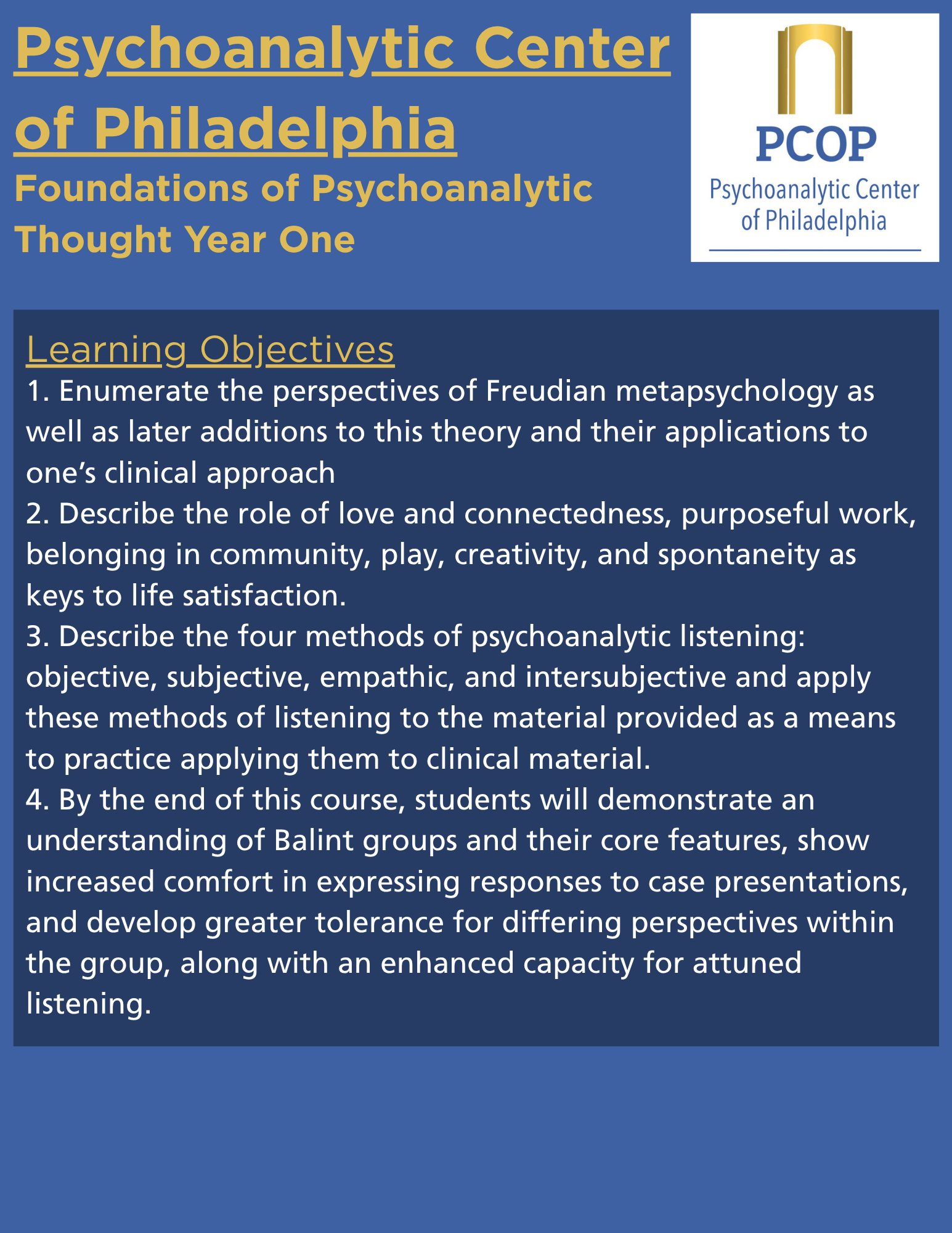 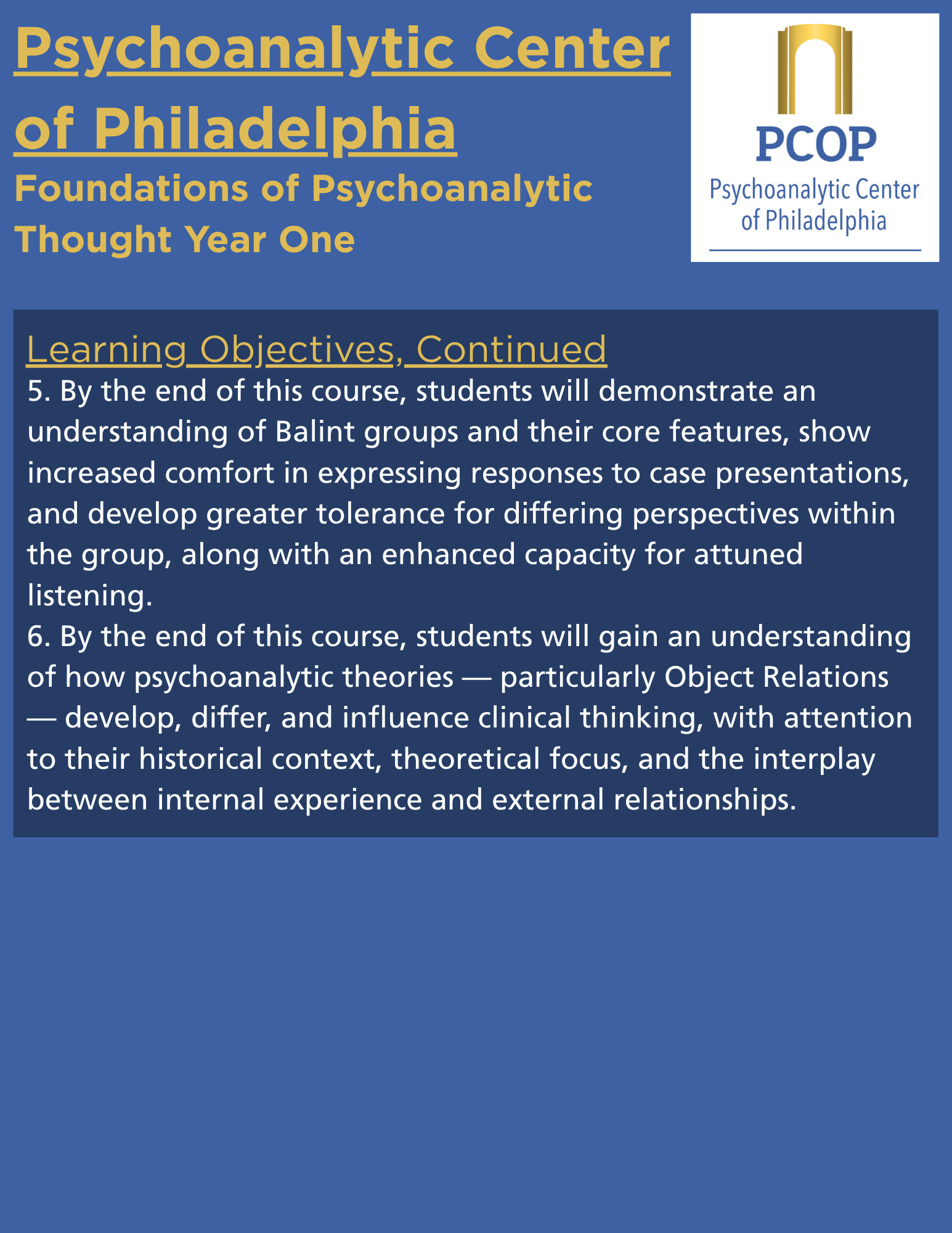 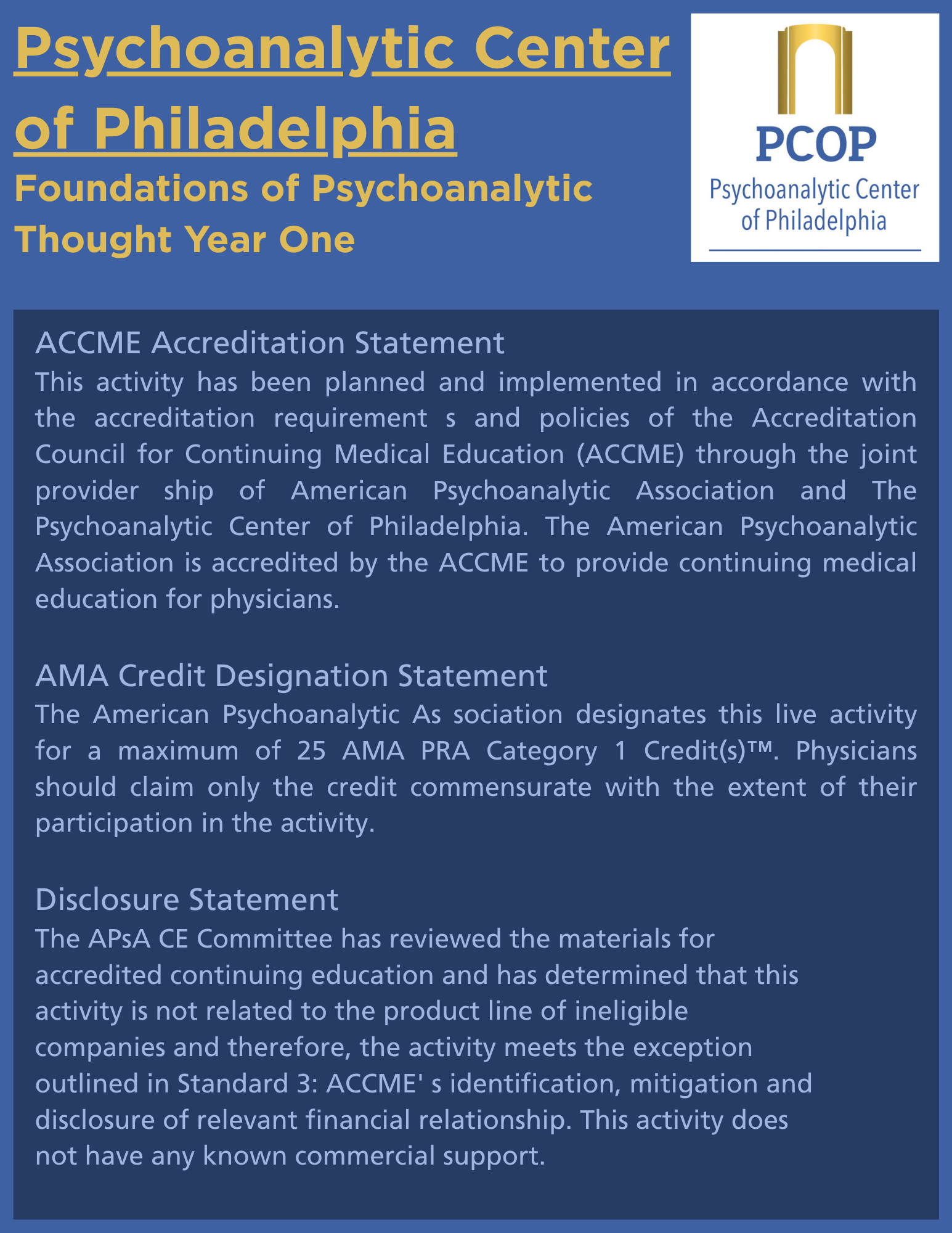
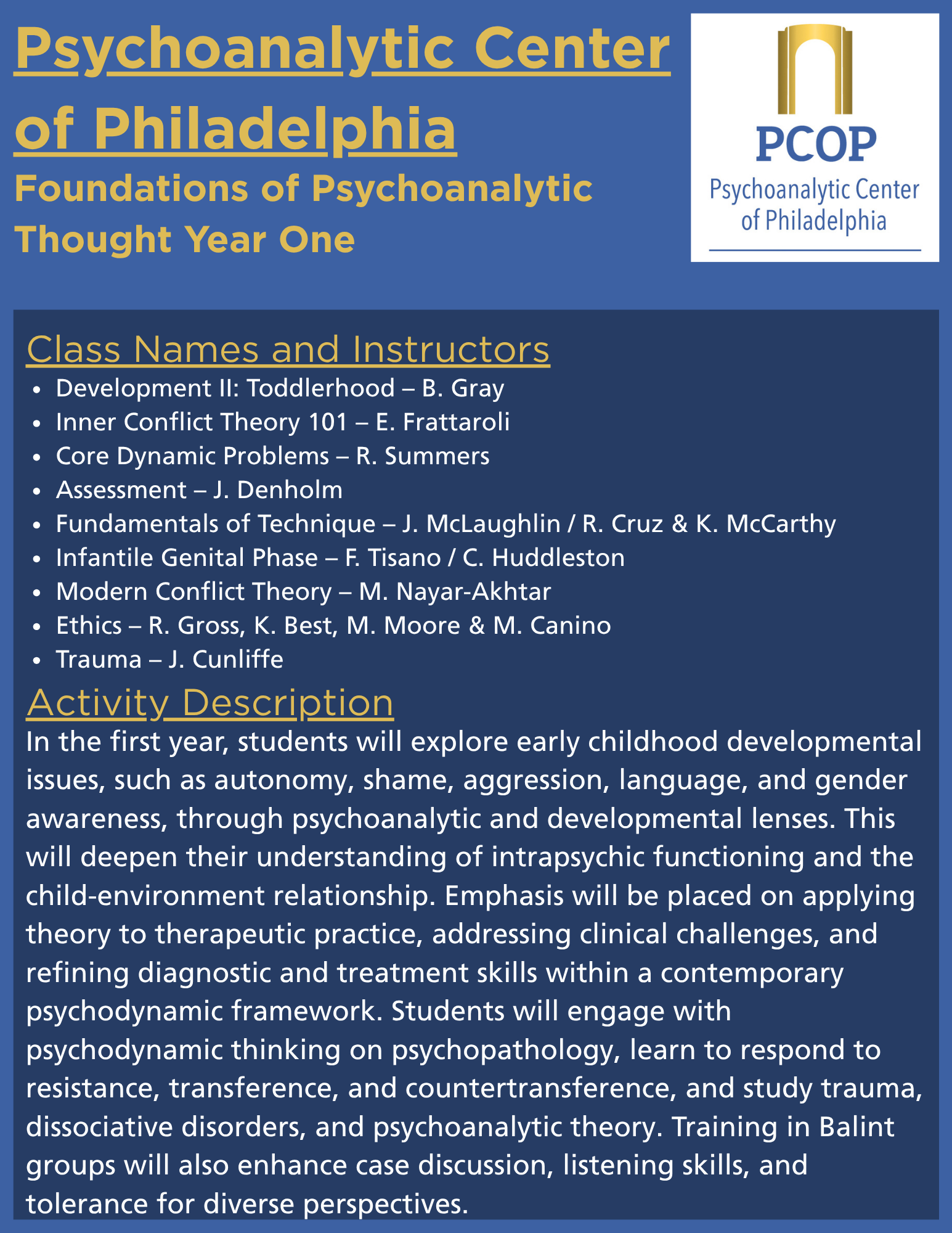 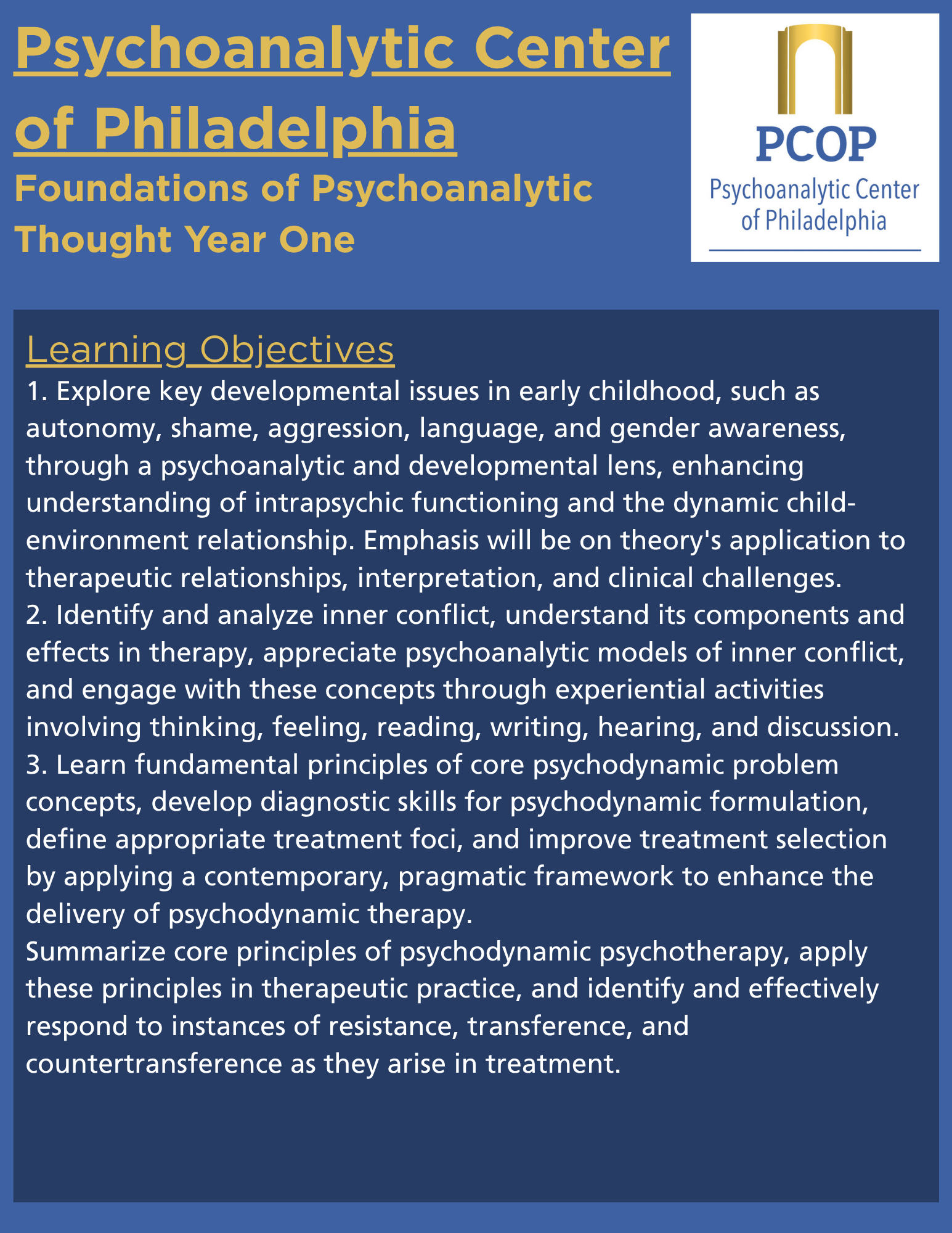 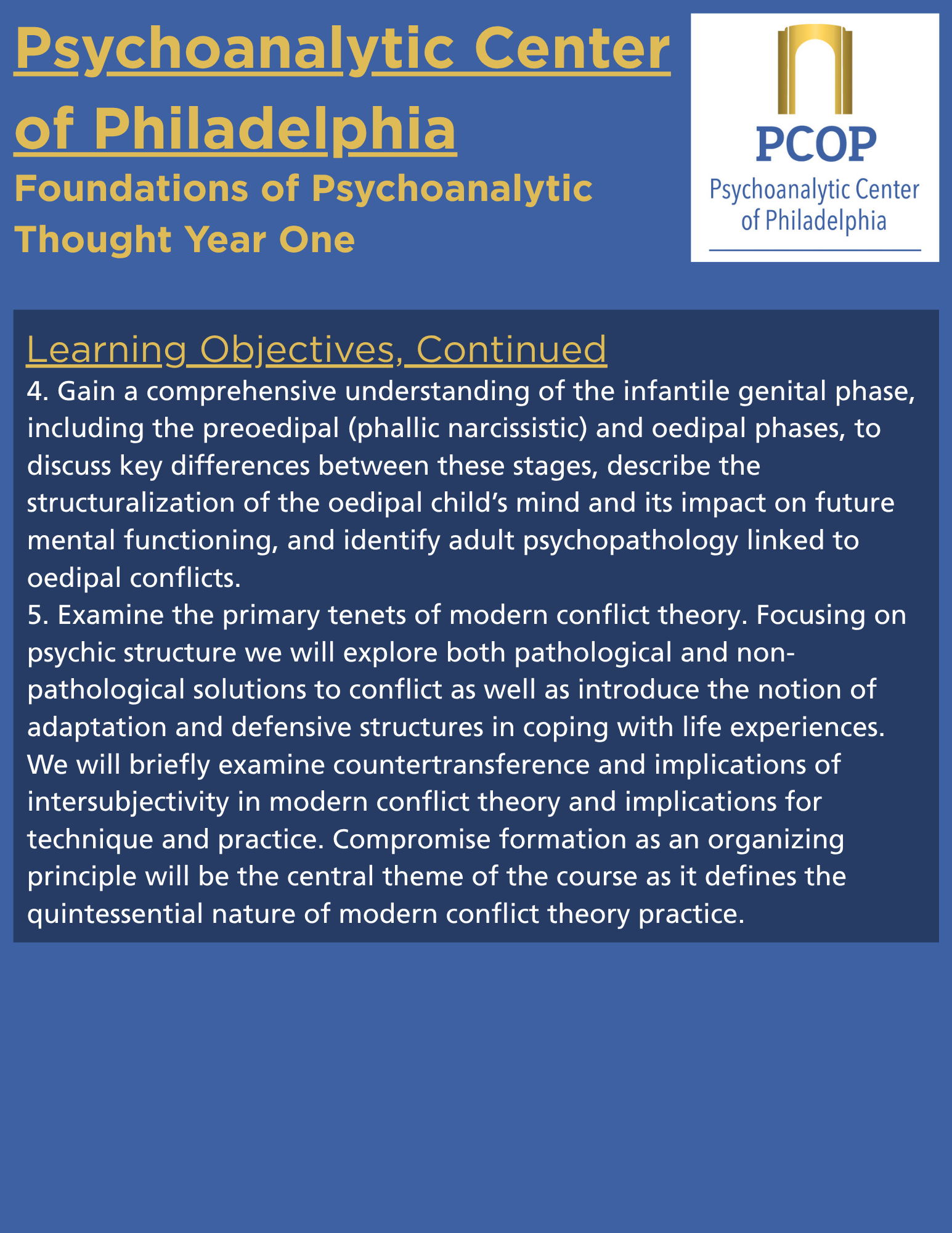  
FOPT Year 2
Course Title: Neurosis
Instructor: Michael Canino, MD
Start Date: 9/2/2025
End Date: 10/7/2025
No. of Sessions: 5
At its most basic level neurosis can be understood as repetitive symptomatic patterns of behavior that result from internal conflicts as informed by underlying character structure. These conflicts are typically related to childhood experiences and at times trauma. Patients in psychotherapy and analysis often present in some degree of distress which can be understood as their unconscious compromise between these conflicts. Although each person is unique, there are common clusters of symptoms that have been categorized and described by David Shapiro as “neurotic styles” in his books Neurotic Styles and Psychotherapy of Neurotic Character. Nancy McWilliams defines these more along the lines of personality types and expounds upon them in her book Psychoanalytic Diagnosis. In this course we will review a subset of these categories using these books and additional literature and to better identify, assess, and treat these styles using an understanding of their associated developmental drives, affects, defenses, and transference/countertransference.
Course Title: Comparing Psychoanalysis and Psychodynamic Psychotherapy
Instructor: Monisha Nayar-Akhtar, PhD
Start Date: 9/2/2025
End Date: 10/7/2025
No. of Sessions: 5
This course explores the similarities and differences between psychoanalysis and psychodynamic psychotherapy. Through historical context, theoretical foundations, and clinical technique, students will critically engage with both modalities. By the end of the course, students will be able to evaluate the appropriateness, efficacy, and application of each approach in clinical settings. In addition, we will also explore how to transition a patient from psychotherapy to psychoanalysis paying attention to technique and theory. The role of the therapist in each case will be examined.
Course Title: Transference
Instructor: Rachel Gross, MD (Cohort A); Lana Fishkin, MD (Cohort B)
Start Date: 10/14/2025 (Cohort A); 11/18/25 (Cohort B)
End Date: 11/11/2025 (Cohort A); 12/16/25 (Cohort B)
No. of Sessions: 5
The course will provide a sample of important papers on the topic of transference with the goal of providing both a historical perspective and showing the evolution and use of the concept over time. Much of what has been written about transference is in relation to psychoanalytic treatment, but I encourage you to consider how it is also present in your therapy cases.
Course Title: Narcissism
Instructor: Suzanne Benser, MD (Cohort A); David L. Lopez, MD (Cohort B)
Start Date: 10/14/2025
End Date: 11/11/2025
No. of Sessions: 5
We will be reading and discussing how narcissistic difficulties develop, how they disrupt people’s lives, and a range of therapeutic approaches to effectively tailor treatment to the particular needs of your patients. I look forward to hearing any clinical information you would like to bring to class, and hope each of you can share a clinical moment that resonates with something in our readings.
Overall learning objectives: At the end of this course the student will be able to describe and effectively assess narcissistic personality disorders and pathology and discuss approaches to treatment.
Course Title: Development: Latency
Instructor: Richard Cruz, MD (Cohort A); Alejandra Wortman, MD (Cohort B)
Start Date: 11/18/2025 (Cohort A); 10/14/2025 (Cohort B):
End Date: 12/16/2025 (Cohort A); 11/11/2025 (Cohort B)
No. of Sessions: 5
This course focuses on child development that takes place between the ages of approximately six and twelve years. Historically, this had been referred to as the period of Latency, a supposedly quiet period characterized by a “biological lessening of drive activities” (Freud, 1926), during which ego defenses are reorganized and behavior is static.Through our readings, observations and discussions, however we will quickly see that this is in fact a rich, complex, fascinating and delightful period during which a great many physical, emotional and cognitive changes take place.
We will explore paths of normal development as well as deviations and interruptions which can complicate adaptation and lead to more pathological means of adjustment. Implications for treatment will also be explored as well as some more specific changes characterizing preadolescence.
Course Title: Countertransference
Instructor: Ralph Fishkin, DO (Cohort A); Lauren Katz, MD (Cohort B)
Start Date: 11/18/2025
End Date: 12/16/2025
No. of Sessions: 5
Countertransference class objectives are for students to gain an understanding of the history of countertransference. Students will be able to articulate ways in which hate in the countertransference can be understood and managed in therapy. Students will be able to describe different types of countertransference love and how to avoid pitfalls, and students will gain a preliminary understanding of how to manage projective identification and enactments in treatment.
The therapeutic encounter can stir up strong emotional responses in the therapist as well as in the patient. Understanding and sensitively handling countertransference is an integral part of therapeutic work. We will consider ways to listen for, become aware of, and determine how to handle our reactions to our patients. We will discuss the nature of enactments and how to understand and use them to advance the therapy. Bring questions and case examples to discuss in class.
Course Title: Continuous Case Conference
Instructor: Sally Holtz, PhD
Start Date: 1/6/2026
End Date: 2/10/2026
No. of Sessions: 5
Course description coming soon.
Course Title: Defense and Resistance
Instructor: Jill Ragozzino McElligott, LCSW and Christopher DiOrio, MLA, MS
Start Date: 1/6/2026
End Date: 2/10/2026
No. of Sessions: 5
The purpose of this course is to provide you with a brief overview of defense and resistance as it manifests itself within the clinical process. We will explore this seminal aspect of clinical theory and practice in all of its dynamic complexity, starting from the nature of its discovery, to its mid-century resurgence, swiftly moving to a contemporary examination of some of the bedrock motives for defense and resistance and the mutuality of defense and resistance in the analytic process. We will examine the notion of intrapsychic danger in all of its complexities (e.g. defense and resistance come in many forms, defend against various painful contents and serve many conflictual purposes); why it is an inevitable part of any treatment (along with the inevitable countertransference); and how it is connected to gaining access to increasingly deeper layers of warded off feelings, deepens the therapeutic process and creates the context for an emotionally transformative experience for everyone involved. I hope you leave this course with a picture of its historical context, intrigued by its emotional intricacies; and supported and strengthened by appreciating the intellectual and emotional excitements and rigors facing the analyst working in the throes of defense and resistance.
Course Title: Borderline Organization
Instructor: Frank Schwoeri, PhD
Start Date: 2/17/2026
End Date: 3/17/2026
No. of Sessions: 5
At the completion of this course, students will be able to describe the development and evolution of psychoanalytic theory and technique in the understanding and treatment of borderline level disorders. Understand the concepts of splitting, projective identification, and countertransference and their particular relevance to treatment of persons with borderline level disorders. As well as understand the use of the therapist’s self in treatment.
Throughout the course, participants are encouraged to discuss identity-disguised clinical examples from their own practices when relevant to the topic being presented.
Course Title: The Erotic Body
Instructor: Sidney Miller, PhD, RN, LCSW
Start Date: 2/17/2026
End Date: 3/17/2026
No. of Sessions: 5
This course presents psychoanalytic views of sex, acknowledging the context of biology, gender, form, desire, and politics as contributions, rather than detractions from the primary subject. A seminar format will be employed, supporting individuals to select from scheduled and recommended works, the critical questions and comments that enhance the learning of the group.
Course Title: Adolescence
Instructor: Alejandra Wortman, MD and David L. Lopez, MD
Start Date: 4/7/2026
End Date: 5/5/2026
No. of Sessions: 5
At the completion of this course, students will be able
-
To broaden your knowledge of the psychoanalytic understanding of adolescent development.
-
To examine several concepts that are key to a contemporary analytic conception of the adolescent period: separation from parents, movement toward adulthood, sexual identity, consolidation of the superego and the ego ideal.
-
We will address adolescent themes, struggles and conflicts in the treatment of adult patients.
Course Title: Ethics
Instructor: Rachel Gross, MD et al.
Start Date: 4/7/2026
End Date: 5/5/2026
No. of Sessions: 5
In this course on Ethics, which we view as a life-long and evolving foundation for psychoanalytic practice, we hope to highlight ethical concerns, conflicts, and dilemmas that surface in beginning, conducting, terminating, and even following a psychoanalytic treatment. As you all know, the most conspicuous ethical matter that has garnered attention within and from outside our field has been that of boundary violations, most notoriously of the sexual kind, and we will be focusing on that subject within our course. We will also be focusing on non-sexual boundary matters, such as self-disclosures, gift exchanges, dual relationships, fee negotiation, and potential conflicts of interest for the analyst. We will discuss how ethical considerations regarding some of these issues may shift over the course of a long treatment. We will touch on reporting obligations for the analyst, and on the candidate’s perspective regarding breaches of ethical conduct. We will assign some readings about ethical considerations inherent in writing about the clinical experience. We will talk about institutional dynamics surrounding an ethical violation. And finally, we will have one class devoted to the ethical perspective regarding informed consent when you begin a psychoanalytic treatment, and engage your patient in a dialogue about the pros and cons of analytic treatment while you are candidates, subject to the impingements of the educational system and the supervisory process. Of course, for each of these subjects, we will welcome students’ case vignettes from their own clinical experiences.
Course Title: Continuous Case Conference
Instructor: Bruce Levin, MD
Start Date: 5/12/2026
End Date: 6/16/2026
No. of Sessions: 5
There will be a description of an adult case and then discussion by group members about the case.
Learning Objectives:
-
To improve understanding of adult psychodynamics
-
To improve understanding of the technique of psychotherapy with adults
-
To better understand countertransference issues
Course Title: Working with Dreams
Instructor: Lawrence Blum, MD
Start Date: 5/12/2026
End Date: 6/16/2026
No. of Sessions: 5
In our five classes we’ll plan to learn some general knowledge and theory of dreaming, to read a few classic articles, and study one of the most famous dreams in history (along with some additional remarkable dreams). At the same time, we’ll try to maintain a clinical focus, discussing the place of dreams in the therapeutic process, and considering vignettes from your practices and mine.
In the first session, I’ll give a small lecture on sleep, dreams, and analytic theory of dreams. We’ll read a chapter by Charles Brenner and a brief paper by Elio Frattaroli, a member of our faculty. An optional recently published paper provides a contemporary review of psychoanalytic dream theories in relation to empirical research. In each of the following sessions we will discuss one important article, and then discuss a case which will afford us the opportunity to consider dreams in relation to psychotherapeutic processes.
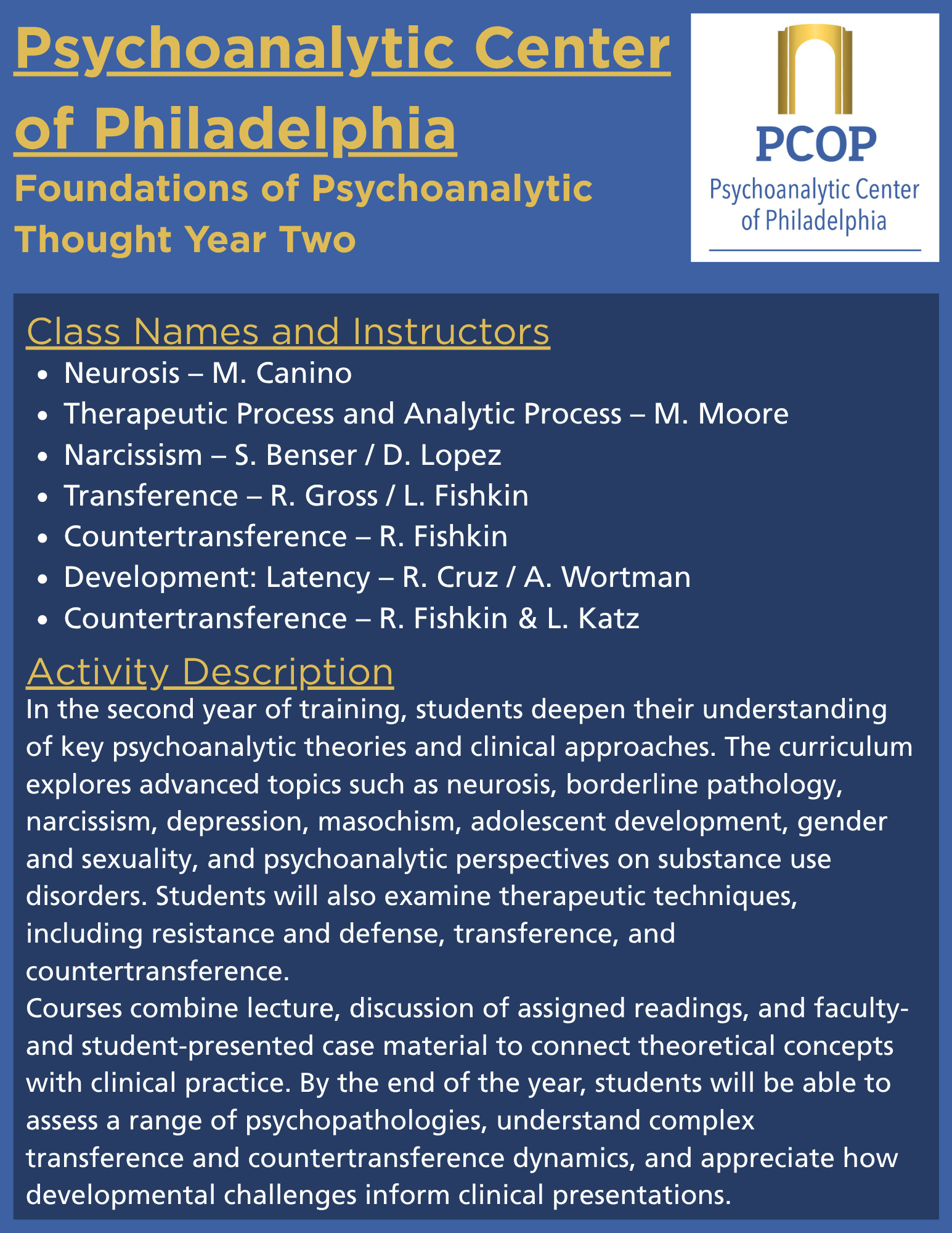 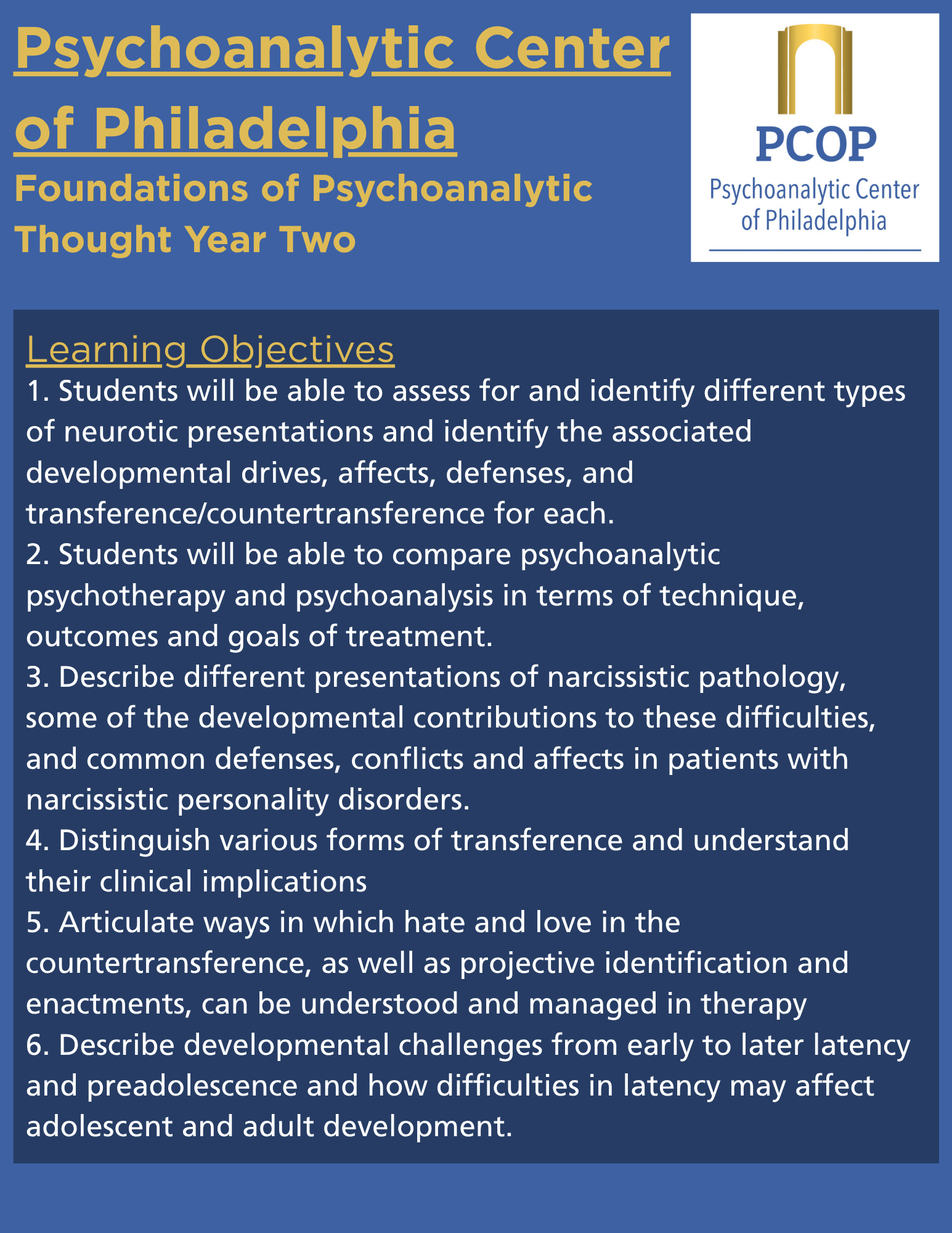 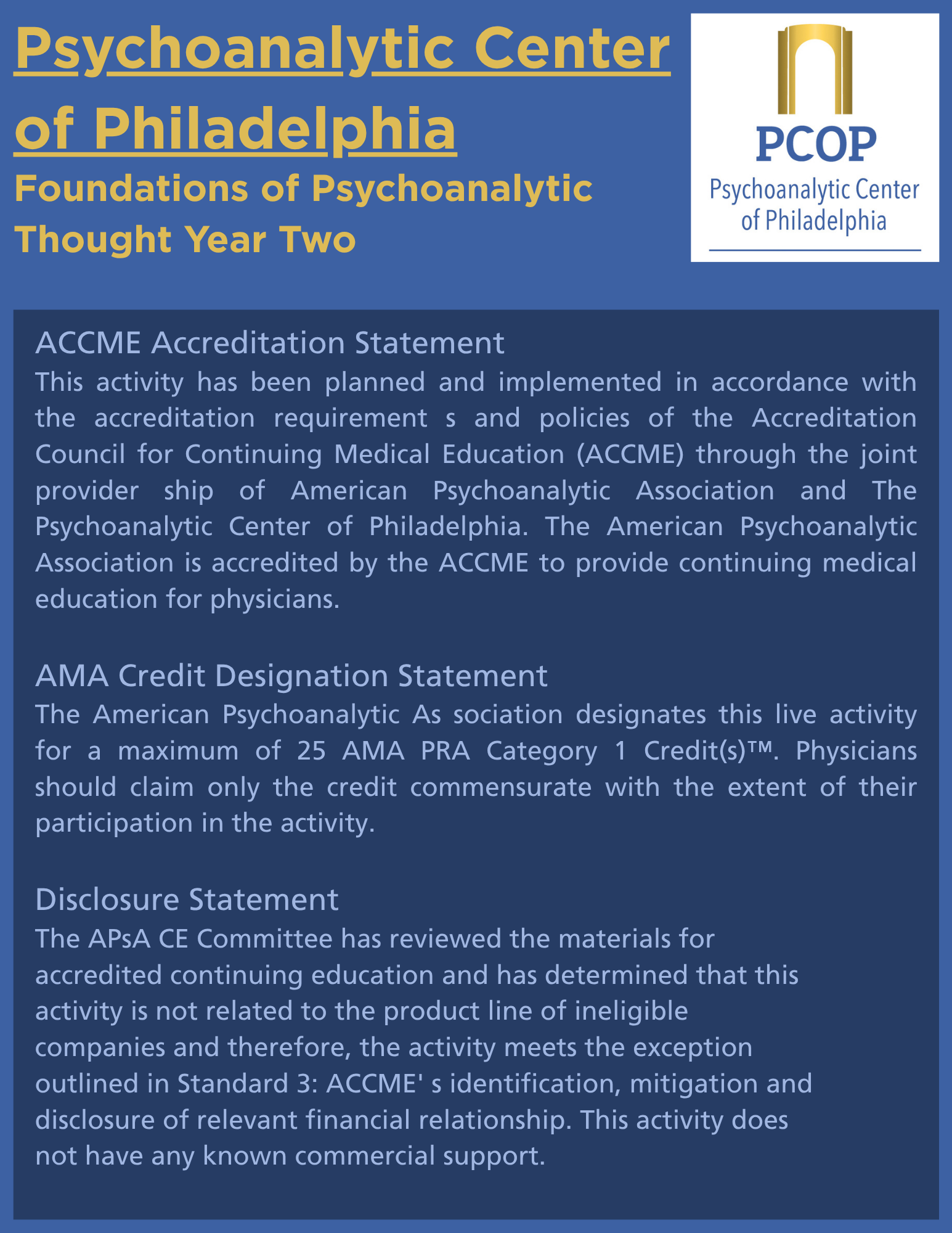
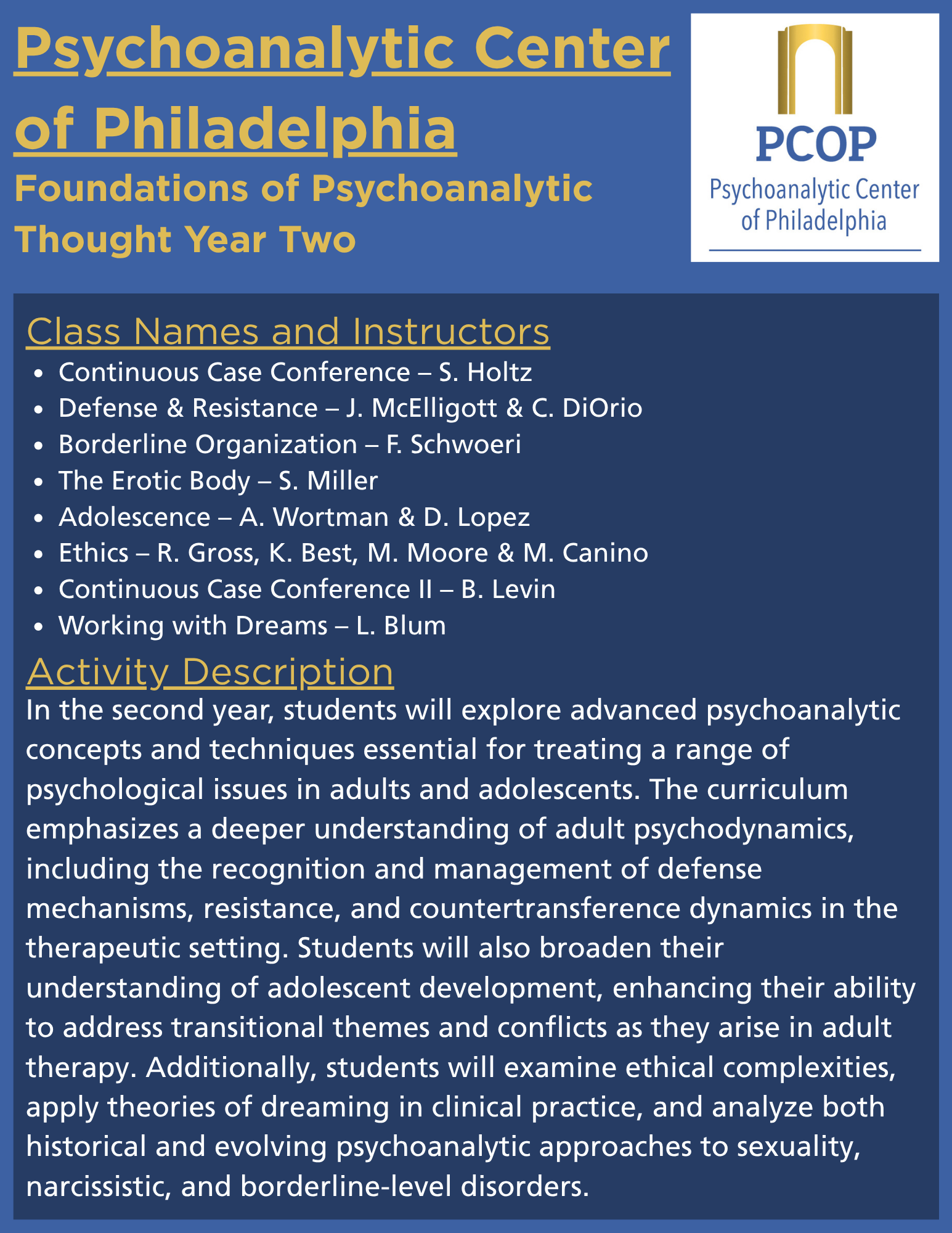 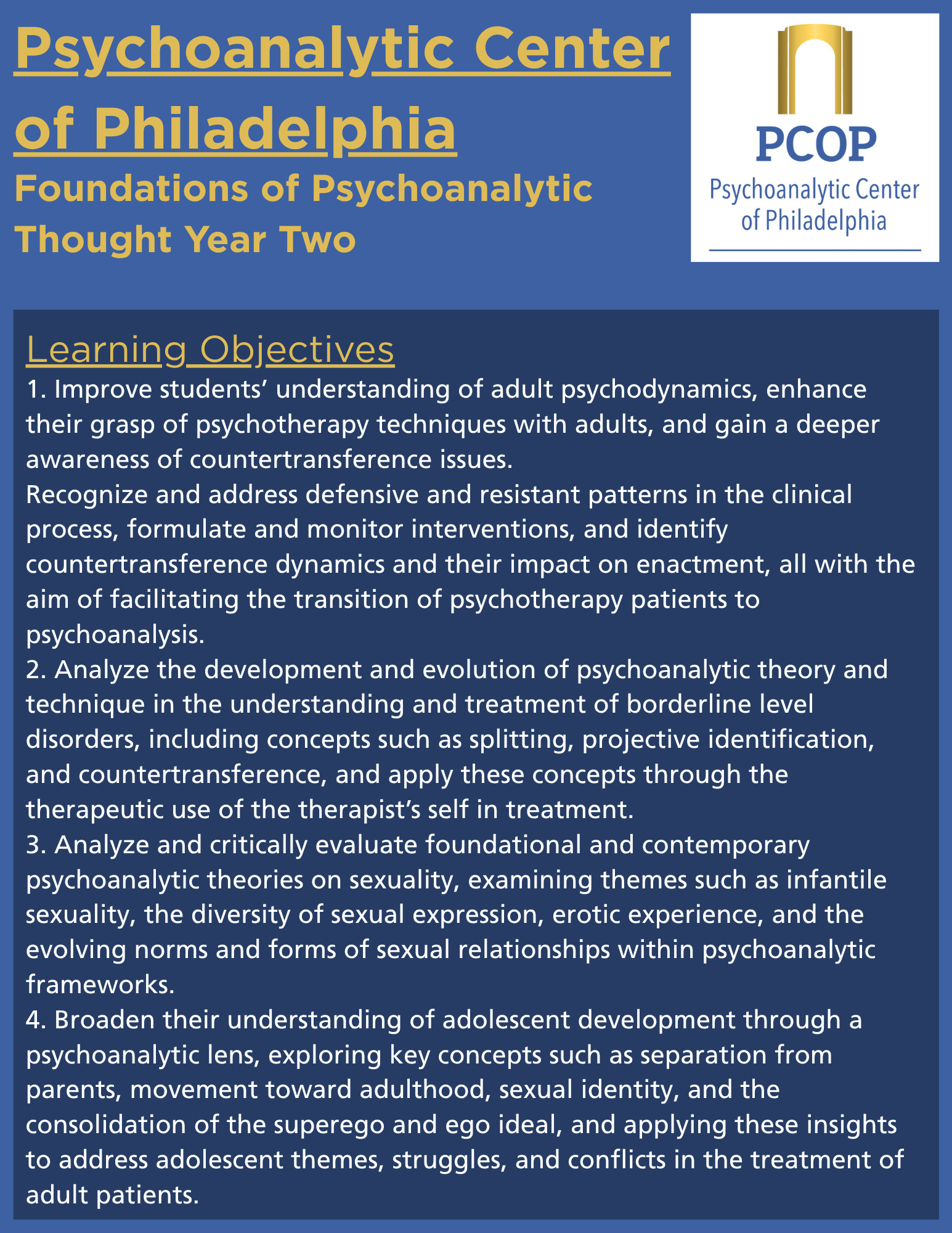 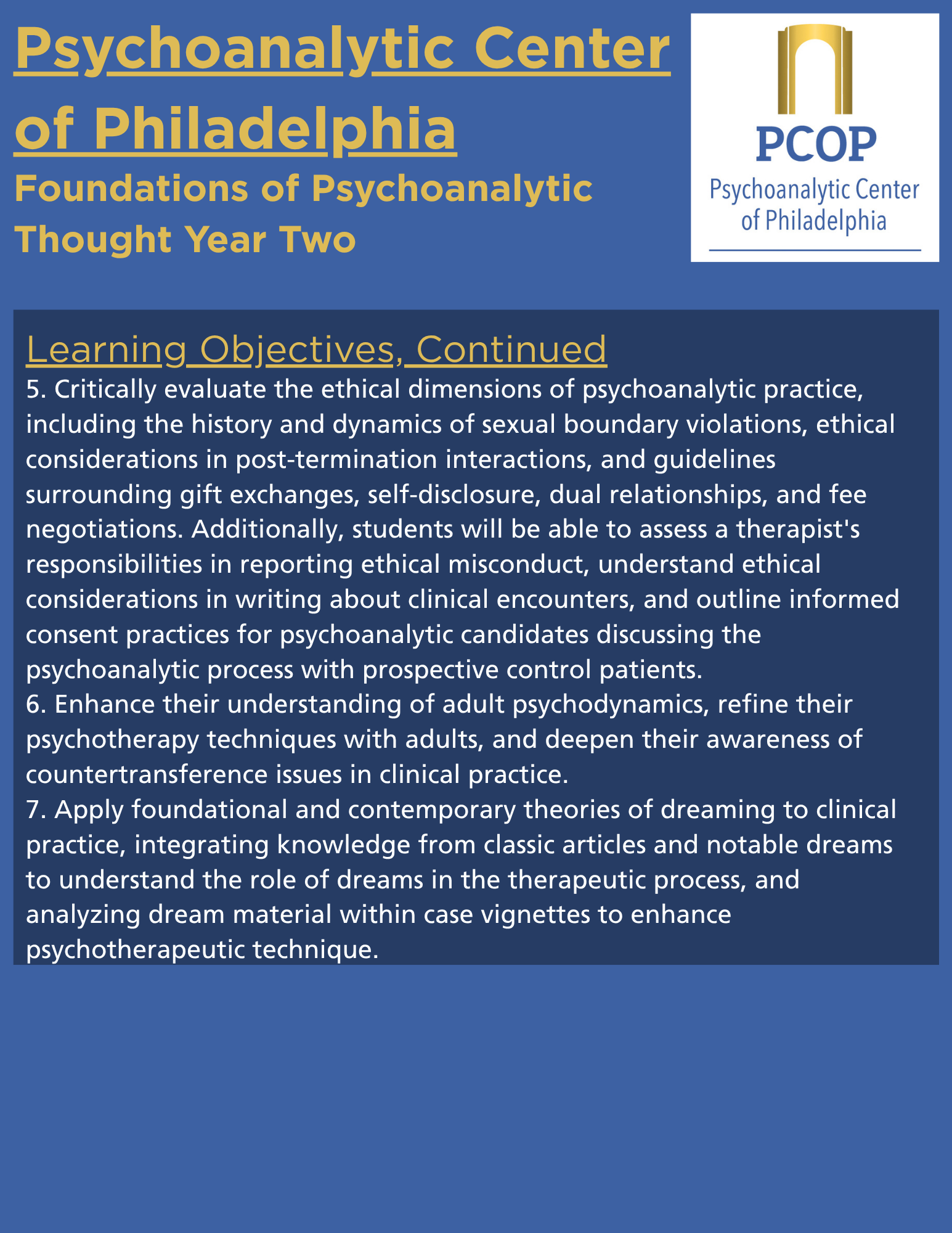 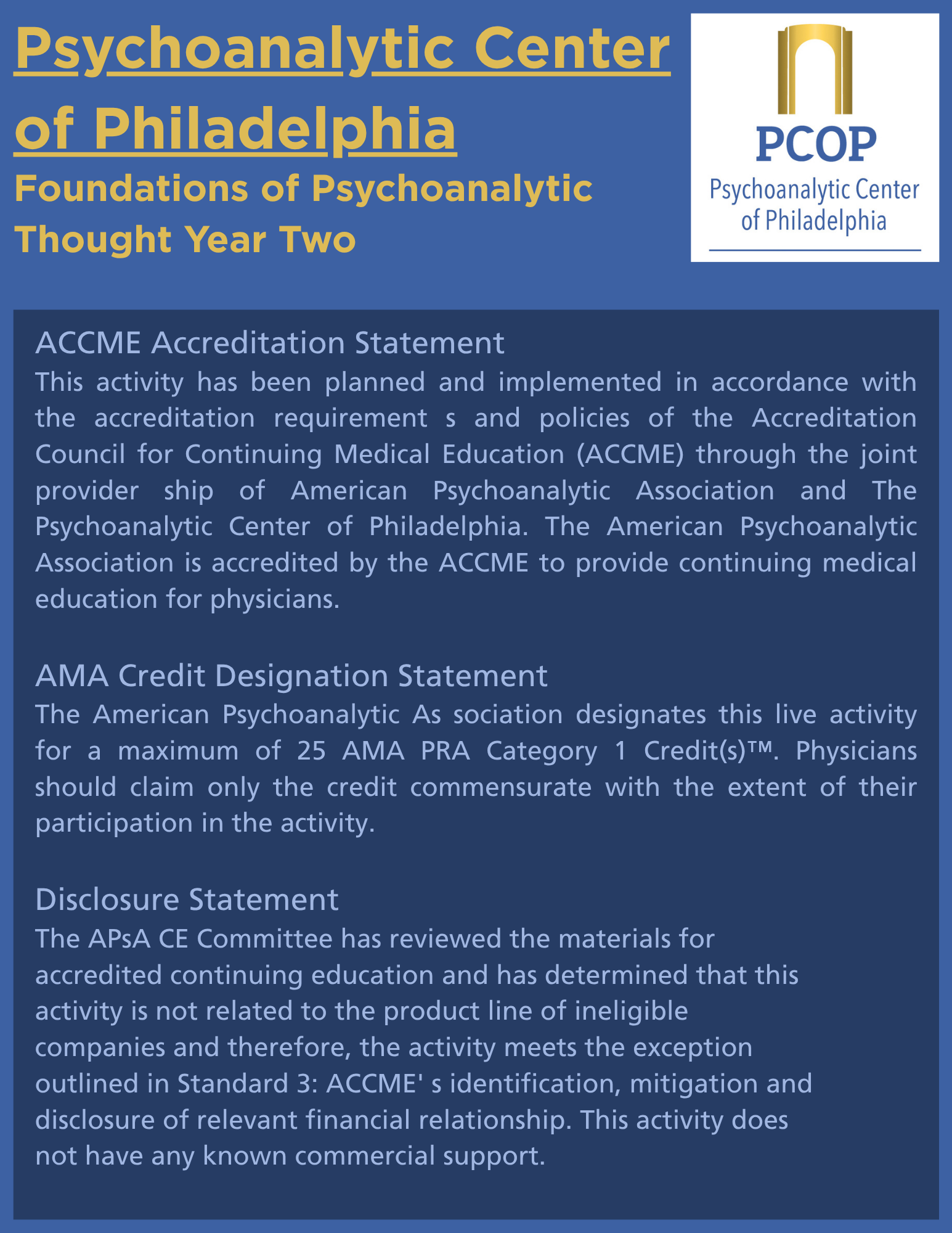
4:45 Courses
Course Title: Practice Psychoanalysis
Instructor: Miriam Field, MSS, MLSP
Start Date: 9/2/2025
End Date: 9/30/2025
No. of Sessions: 4
The goal of these four sessions is to give you a broad overview of basic aspects of the psychoanalytic situation, attitude, process and technique. These issues will be dealt with in more depth in future courses. Our aim is to give you a preliminary vision of how all these ideas tie together. These ideas take time to integrate.
Course Title: Inner Conflict Theory 101
Instructor: Scott Stehle, MD; Elio Frattaroli, MD
Start Date: 10/7/2025
End Date: 11/18/2025
No. of Sessions: 7
Why study conflict theory? What is the clinical usefulness of listening for intrapsychic conflict and attempting to model it in the mind? In part, as a guide to broaden the scope of how we hear and conceptualize our patients/clients, as well as to gather and summarize our collective clinical experience to develop more accurate representations of the human mind.
Usually when we listen to and talk with our clients/patients we prioritize a focus on what it is that is troubling them. Some of this may involve painful feelings such as fear or sadness, problems in relationships with others, frustrating behaviors that seem disadvantageous, and much more. Upon therapeutic investigation it frequently emerges, at first often more clearly to us than to the patient/client, that some inner conflict, for instance, a desire and a restriction on it, a wish and a fear, or a clash of values, is operating in their troubles and may be paralyzing them in life. Often one or more elements of the conflict are out of their awareness.
For example, when someone is embarking on a romantic relationship they may experience all manner of conflicts. One of these might involve romantic and sexual feelings and how these conflict with personal values and realistic factors. These elements of the conflict may be partially within awareness and partially out of consciousness.
When we listen for such inner conflict, we aspire to recognize how conflicting agendas arise and are configured. This may allow us to help those we are working with in treatment to attain a greater capacity for conscious compromises between conflicting elements rather than pursuing often futile attempts to have all things all ways. Recognizing how conflicts are managed can also facilitate greater flexibility and accommodation in such management.
It is quite helpful in such circumstances to have a model of how conflict works in the mind and how the mind works in and with conflict. The search for a model of the mind, which has a theory of conflict at its core is more than one hundred years old and occupied much of Freud’s thinking throughout his career. From reading about his cogitations and reworkings of conflict theory we can come to appreciate the challenges of his endeavor amid the necessary complexity of this aspect of psychoanalytic theory. His theories have formed the basis for further developments in psychoanalytic modelling. We will examine his early conflict theory, topographic theory, and structural theory, all with shortcomings resulting in modifications, and, hopefully come to appreciate this re-working as an ongoing work in progress wherein none of us have final answers, only questions and hypotheses.
Course Title: Object Relations
Instructor: Sydney Pulver, MD
Start Date: 11/25/2025
End Date: 1/6/2026
No. of Sessions: 5
At the completion of this course, students will be able to
-
To consider what it means to be a theory so that we can be more thoughtful about the different psychoanalytic theories to which we are exposed and how they might be useful to us.
-
To trace the emergence and development of Object Relations Theory, beginning with Freud, and briefly study some of its main developers. This should give you both a general understanding of each approach, its evolution and an historical frame to help you locate different theoretical positions (hopefully, to make them less confusing).
-
To consider how different theories may either emphasize developmentally emerging inner structuring of experience and/or emphasize how external experiences become internalized.
-
To understand the powerful impact each theoretical approach (with emphasis on Object Relations Theories) has upon all aspects of the analyst's technical stance, thinking, and procedures.
Course Title: Psychoanalytic Assessment
Instructor: Jill Ragozzino McElligott, LCSW
Start Date: 1/13/2026
End Date: 2/17/2026
No. of Sessions: 5
The purpose of this course is to provide you with a brief overview of the assessment process for psychodynamic therapy and psychoanalysis. I am including both since analytic cases often come from your therapy practices. We will try to cover this topic, as comprehensively as possible by considering the patient’s presentation, your countertransference, and therapeutic “match.” This course will be followed by “Deepening the Treatment” later in the year, which will expand upon our discussions here.
We will consider the history of assessment, bedrock aspects of assessment (e.g. personality style, level of functioning, ego strength/psychological mindedness, defenses, sociological context} as well as listening for the transference and attending to the countertransference. We will focus on various process variables, such as how a person talks about their problem and responds to your trial interventions, the burgeoning connection, and the evolving complexities of the assessment process.
Course Title: Modern Conflict Theory
Instructor: Monisha Nayar-Akhtar, PhD
Start Date: 2/24/2026
End Date: 3/24/2026
No. of Sessions: 5
In this course we will examine the primary tenets of modern conflict theory. Focusing on psychic structure we will explore both pathological and non-pathological solutions to conflict as well as introduce the notion of adaptation and defensive structures in coping with life experiences. We will briefly examine countertransference and implications of intersubjectivity in modern conflict theory and implications for technique and practice. Compromise formation as an organizing principle will be the central theme of the course as it defines the quintessential nature of modern conflict theory practice.
Course Title: Psychoanalytic Reading of First Person Short Stories As Case Studies
Instructor: D. Sachs, R. Fishkin, M. Moore
Start Date: 4/7/2026
End Date: 5/5/2026
No. of Sessions: 5
How do we assess and select a patient who is suitable for analysis? How does this assessment method aid us in setting up the analytic treatment frame and influence how we listen and think about the clinical material? To address these questions, we are reading five short stories, most written in the first person.
Psychodynamic Psychotherapy Training Program (PPTP)
Our Psychodynamic Psychotherapy Training Program offers a comprehensive curriculum designed to equip students with advanced skills and insights in treating a range of psychological issues. Participants will engage in specialized courses tailored to deepen their understanding and practice in key areas of psychodynamic theory and clinical application. Courses combine theoretical lectures and case studies to ensure participants gain both theoretical knowledge and hands-on clinical skills. Experienced faculty members facilitate discussions and provide personalized feedback to enhance learning and application. Upon completion, participants will be equipped with enhanced clinical competencies and a deeper understanding of psychodynamic principles and their application across diverse clinical contexts. They will be prepared to integrate advanced techniques into their practice, contributing to improved patient outcomes and enhanced therapeutic relationships.
Classes are held weekly on Tuesdays from 6:00pm to 9:00pm, beginning in September, at Rockland Mansion, E. Fairmount Park, 3810Mt. Pleasant Drive, Philadelphia, PA 19121.
All class sessions are one hour and thirty minutes long. Specific class information (date, time, location, instructor) will be provided to students upon acceptance to the program.
PPTP Year 3
Course Title: Eating Disorders
Instructor: Peggy Walsh, MS, LMFT
Start Date: 9/2/2025
End Date: 9/30/2025
No. of Sessions: 4
Integrating Psychodynamic Psychotherapy with other modalities (Cognitive Behavioral/Educational, Biological, Cultural/Feminist, and Family Theory) to treat the whole person. This course introduces the history and treatment of eating disorders, reviews current theories in eating disorders, and encourages the clinician to think in a multifaceted way when evaluating and treating a person with disordered eating.
At the completion of the course, the participant will be able to name and differentiate three distinct eating disorders as well as how they fit into a continuum of disordered eating. Identify and apply two or more techniques of psychodynamic psychotherapy in a complementary way with other treatment modalities to deepen the treatment of a person with disordered eating. As well as identify and use transference and countertransference responses specific to work with persons with disordered eating, particularly the therapist’s body, as material.
Course Title: Technique VII: Group Psychotherapy
Instructor: Andrew Smolar, MD
Start Date: 9/2/2025
End Date: 9/30/2025; fifth session on 3/31/2026
No. of Sessions: 5
In this course, we will be discussing group psychotherapy as a psychotherapeutic treatment modality. We will briefly discuss the origins of group psychotherapy as a modality, its having branched away from psychoanalysis, and its re-entry into the psychodynamic field as a treatment option. Most of the course will focus on the nuts and bolts of establishing a long-term psychotherapy group: the indications for the treatment modality, patient selection, stages of group development, therapeutic factors in operation, leadership stance and techniques, and combining individual with group psychotherapy. We will spend some time on other kinds of group therapy, such as short-term issue-focused groups and support groups, and we will discuss how they differ from long-term therapy groups. We will rely mostly on the standard group psychotherapy textbooks, those by Yalom, and Rutan and Stone. I will also assign several other articles to illustrate some of the points that will be the stimulus for discussion. Most of all, I hope to share with you my excitement about leading groups, and their potential benefit when added to some patients’ individual treatments. Moreover, it is fun to learn, and has the ability to increase the breadth and depth of your therapeutic skills.
Course Title: Depression and Masochism
Instructor: Benjamin Tavares, MSW, LCSW
Start Date: 10/7/2025
End Date: 11/4/2025
No. of Sessions: 5
This course will explore the theoretical underpinnings of depression, both as a clinical state and as an effect. The course begins with Freud’s concepts of depression as rooted in early object loss and its relation to mourning, through Freud’s differentiation of mourning from the state of depression. Brenner’s reformulation of depression as an affected state in response to an experienced calamity will be presented in contrast to Freud. The relationship of masochism to depression though identification with a hated object will be discussed.
The course will have a heavy focus on the presentation and discussion of clinical material provided both by the students and faculty. Students should be prepared to present case vignettes several times during the course.
Learning objectives are to summarize the basic psychoanalytic theory of depression and of masochism, recognize the clinical presentation of conflict based depression and masochism, and apply the technique of psychodynamic psychotherapy to depression and to masochism.
Course Title: Substance Abuse: Psychodynamic Perspectives
Instructor: Brian Frankel, MD
Start Date: 10/7/2025
End Date: 11/4/2025
No. of Sessions: 5
Treatment of addiction seemingly falls into a psychodynamic black hole. Psychodynamic clinicians often don’t want to treat patients with addiction and most people who treat addiction don’t recommend psychodynamic therapy. It is my hope that this class will address both sides of that chasm: that through learning about some of the psychodynamic approaches to addiction you will gain greater comfort and confidence in potentially treating patients with addiction as well as appreciate the unique value of psychodynamic therapy for addiction. Like any other complex illness, addiction is not a monolith and neither is its treatment or psychodynamic understanding. This class will survey multiple authors and models of addiction, expanding the cache of lenses one can use to understand a patient as well as hopefully spark curiosity for some of the major questions intrinsic to addiction: Why does one get addicted and another does not? What does it mean to suffer from addiction? Should behavioral addictions be considered addiction? Which ones? What is the difference between an addiction and a compulsion? What actually helps people with addiction and why? What is recovery from addiction?
Course Title: Discussion on Difference
Instructor: Susan Adelman, PhD, et al.
Start Date: 11/11/2025
End Date: 12/16/2025
No. of Sessions: 5
This course will consider human diversity including race, ethnicity, culture, nationality, religion, and ability. In this course, we will not explicitly cover sexual orientation or gender differences, as these are covered in two other curriculum courses. Within a context of thinking psychodynamically, we will examine these questions: What can we understand about how difference and the dynamics of diversity, privilege, and oppression shape the intrapsychic and play out in the relational field? How do our theories aid us in understanding and working with difference and in what ways do they limit us or perpetuate harm?
Learning objectives are that at the conclusion of this course students will be able to apply and communicate an understanding of the importance of diversity and difference in shaping life experiences, the unconscious mind, the interpersonal, and the treatment process. As well as articulate ways that psychoanalytic theory helps and limits us in working successfully with different patients.
Course Title: Mind & Body
Instructor: Margaret Peterson, PhD
Start Date: 11/11/2025
End Date: 12/16/2025
No. of Sessions: 5
An understanding of mind/body relationships is integral for psychotherapists, as body and mind are inextricably connected in various and complex ways throughout human development, from infancy through old age. The interrelated expressions of psyche and soma are ubiquitous in human experience and clinical practice. We experience ourselves and communicate with others with our bodies as much as we do by words. Our most central and continuous experience lies in our bodies - the core self. Affect itself is embodied, psychosomatic.
Children, adolescents, and adults may present with their primary concerns being bodily symptoms not associated with any defined medical disease. These symptoms include pain, fatigue, dizziness, paralysis, and so forth. (You will find the term ‘medically unexplained symptoms’ in the contemporary literature.) The symptoms may be part of a transient developmental twist or stressor, or may be part of more major and enduring struggles.
We will focus on understanding how mind and body are interrelated, how these connections become problematic and symptomatic, and implications for clinical practice. Many of the readings are of clinical cases, and we will discuss clinical cases, yours and mine, throughout the course.
Course Title: Psychosis
Instructor: Irene Hurford, MD
Start Date: 1/6/2026
End Date: 2/10/2026
No. of Sessions: 5
At the completion of this course, students will be able to develop an understanding of a psychoanalytic/psychodynamic theory of the origins of psychosis, understand the general principles of psychoanalytic/psychodynamic treatment of psychosis, and appreciate the effort involved in the psychodynamic treatment of those at the psychotic level of organization.
Course Title: Case Conference IV
Instructor: Jamie Jessar, PsyD
Start Date: 1/6/2026
End Date: 2/10/2026
No. of Sessions: 5
One student will present an ongoing adult psychotherapy case. Through process notes and group discussion of the case material, students will develop an understanding of the dynamics of the individual being presented. Students will gain even greater understanding of psychodynamic psychotherapy, and understand the specific transferences/counter transferences in the therapeutic dyad.
Course Title: Psychodynamic Psychopharmacology
Instructor: Tyler Fleming, DO, MPH
Start Date: 2/17/2026
End Date: 3/17/2026
No. of Sessions: 5
Course description coming soon.
Course Title: Case Conference: Termination
Instructor: David Lee, MD
Start Date: 2/17/2026
End Date: 3/17/2026
No. of Sessions: 5
Participants will be able to define various aspects of the patient’s termination process, including resolution of the transference neurosis in both termination and post termination phases. Participants will be able to define the aspects of the analyst’s countertransference, including mourning.
Course Title: Trauma and Dissociative Disorders
Instructor: Marta Ludwig, LCSW
Start Date: 3/24/2026
End Date: 4/28/2026
No. of Sessions: 5
This course provides an overview of contemporary analytic thinking about trauma, linking it with classical psychoanalytic views, trauma theory, and current psychiatric thinking. There is particular emphasis on such topics as developmental considerations (with an emphasis on attachment), repetition, enactments, reconstruction, traumatic memory, trauma-related disruptions of memory, the intergenerational transmission of trauma, the impact of trauma upon transference and countertransference, dissociative psychopathology, and modifications of technique in response to trauma-related psychopathology. It will discuss the evolution of a trauma-informed, dissociation-inclusive, and hypnotizability/dissociative-sensitive approach to both the understanding and treatment of mixed relational trauma and Criterion A PTSD severe stress trauma that reintegrates elements marginalized in psychoanalytic scholarship and clinical work since the 1890s.
Course Title: Varieties of Therapeutic Action
Instructor: Francesca Engel, MD & Tuua Ruutiainen, MD, MBE
Start Date: 3/24/2026
End Date: 4/28/2026
No. of Sessions: 5
This course attempts to answer a simple question regarding psychoanalytic treatment: how does this work? The purpose of this course is to familiarize students with various perspectives on therapeutic action in psychoanalysis and psychoanalytic psychotherapy in the hopes of allowing students to elaborate and articulate their own philosophies of therapeutic action. The class will follow a structure of 1) understanding theoretical concepts 2) understanding how these concepts are used (as technique) by experts in the field and 3) examining how our understanding and application of theory may be similar or different from the ideas presented. We will survey perspectives on therapeutic action from the major schools of contemporary psychoanalysis including: ego psychology, object relations, self-psychology, and relational psychoanalysis. We will apply each perspective to actual clinical material from case histories in order to see how theory translates or fails to translate into specific forms of technique. Through clinical application we will interrogate how theories of therapeutic action (how psychoanalytic therapy is supposed to work) may correspond or differ from our actual intended therapeutic actions (how we actually practice psychoanalytic therapy). In doing so, we will create the foundation for a creative dialectic between theory and practice, which will render theory more realistic but also render our practice more considered and yet flexible. Objectives through reading are to describe the defining features of therapeutic action as described by ego psychology, object-relations, self-psychology, and relational psychoanalysis. Understand the similarities and differences regarding therapeutic action for each school. Practice translating theories of therapeutic action into different therapeutic techniques. Articulate your own theory of therapeutic action and understand how this theory implicitly and explicitly influences your technique with patients.
Course Title: Queer and Trans/GNC Identities
Instructor: Margaret Peterson, PhD
Start Date: 5/5/2026
End Date: 6/9/2026
No. of Sessions: 5
Course description coming soon.
Course Title: Psychoanalytic Review
Instructor: Kilian Fritsch, PhD
Start Date: 5/5/2026
End Date: 6/9/2026
No. of Sessions: 5
This course is designed to provide a capstone experience for your learning and experience in the PPTP program, incorporating the principles and practices of “outsider witnessing.”
Each of you will be expected to develop a final presentation which asks you to reflect on your experience, drawing upon your various learning experiences during the past three years: didactic, clinical presentations, and group experiences. Your classmates will reflect on your presentation, and they will present those thoughts as part of our concluding exercise.
 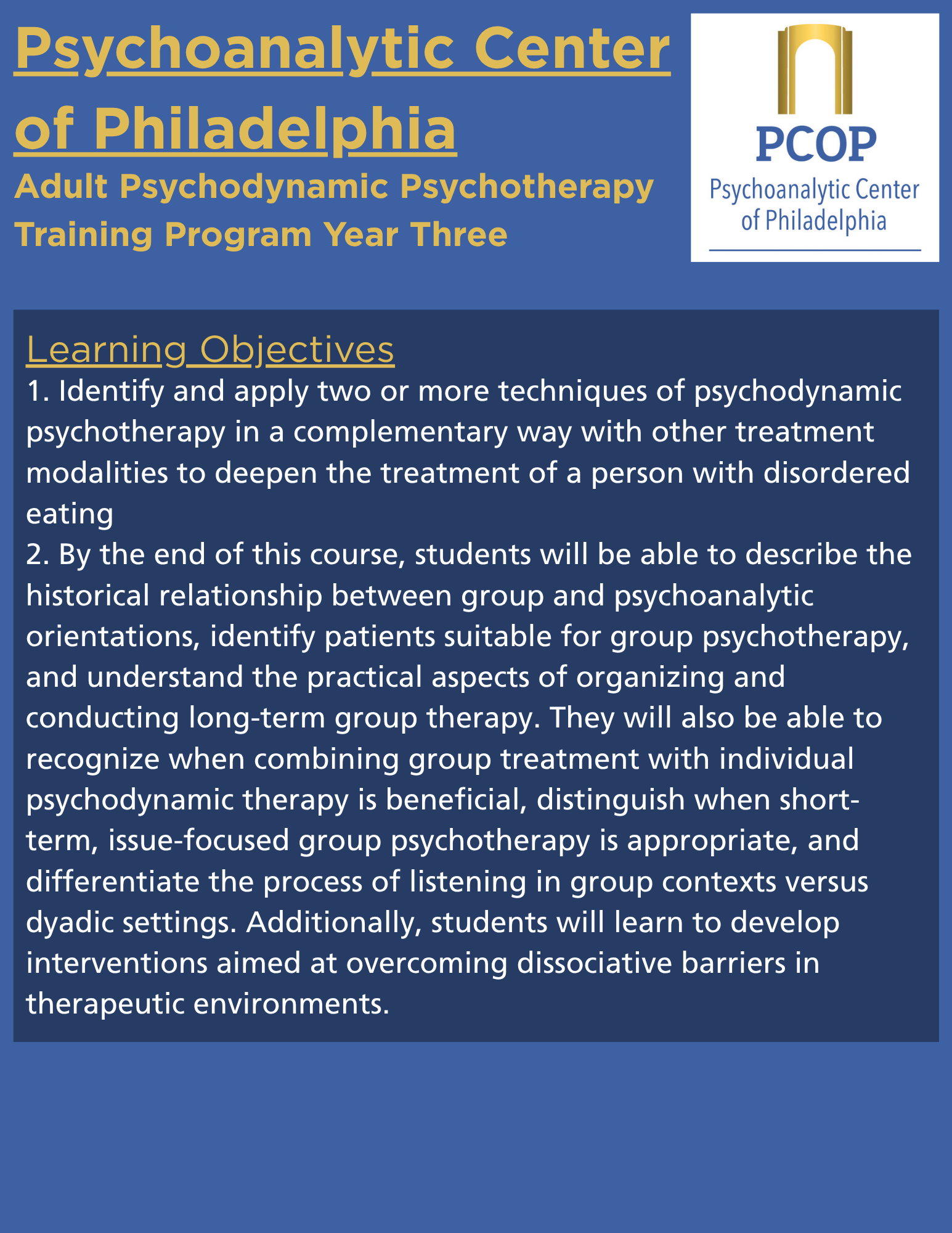 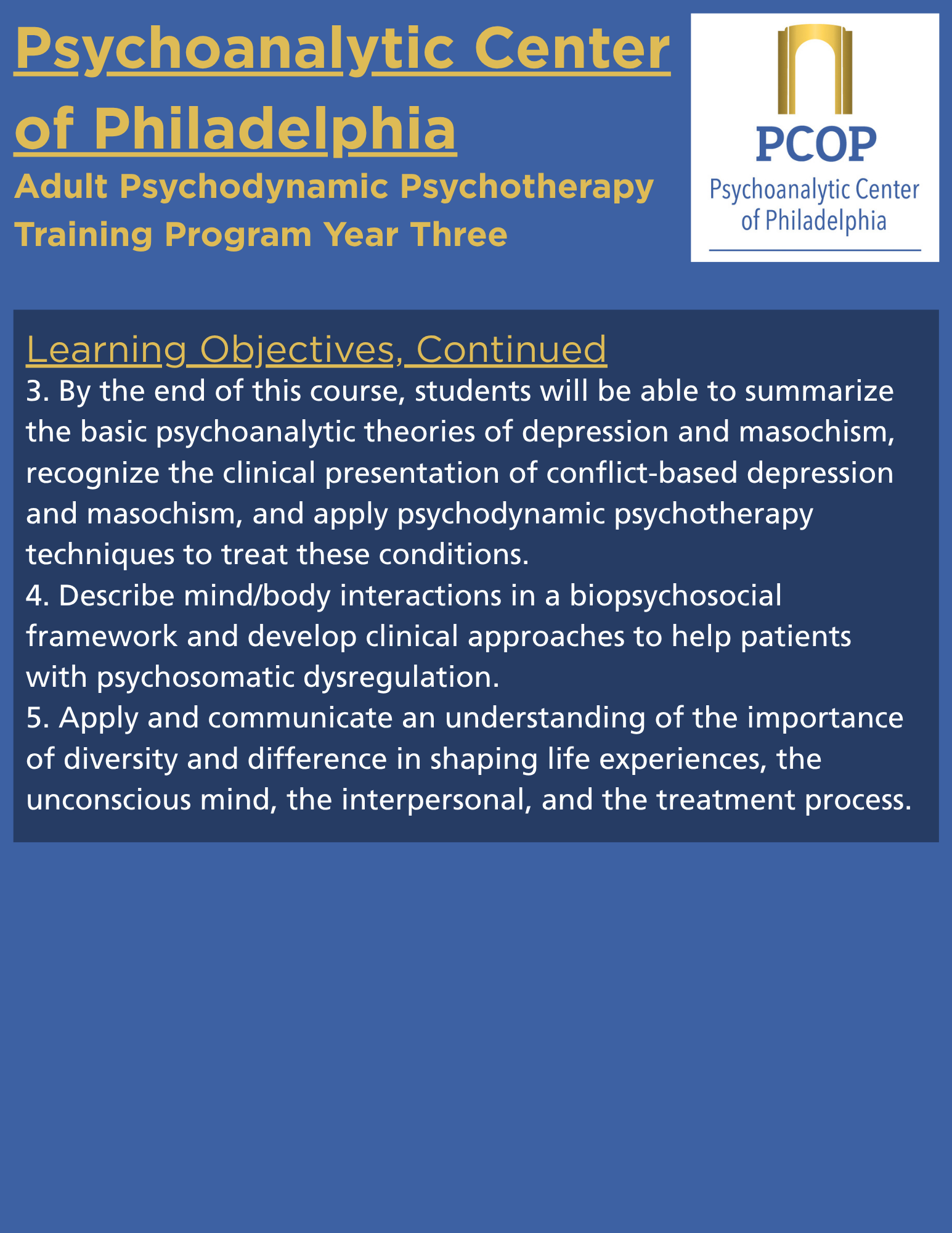 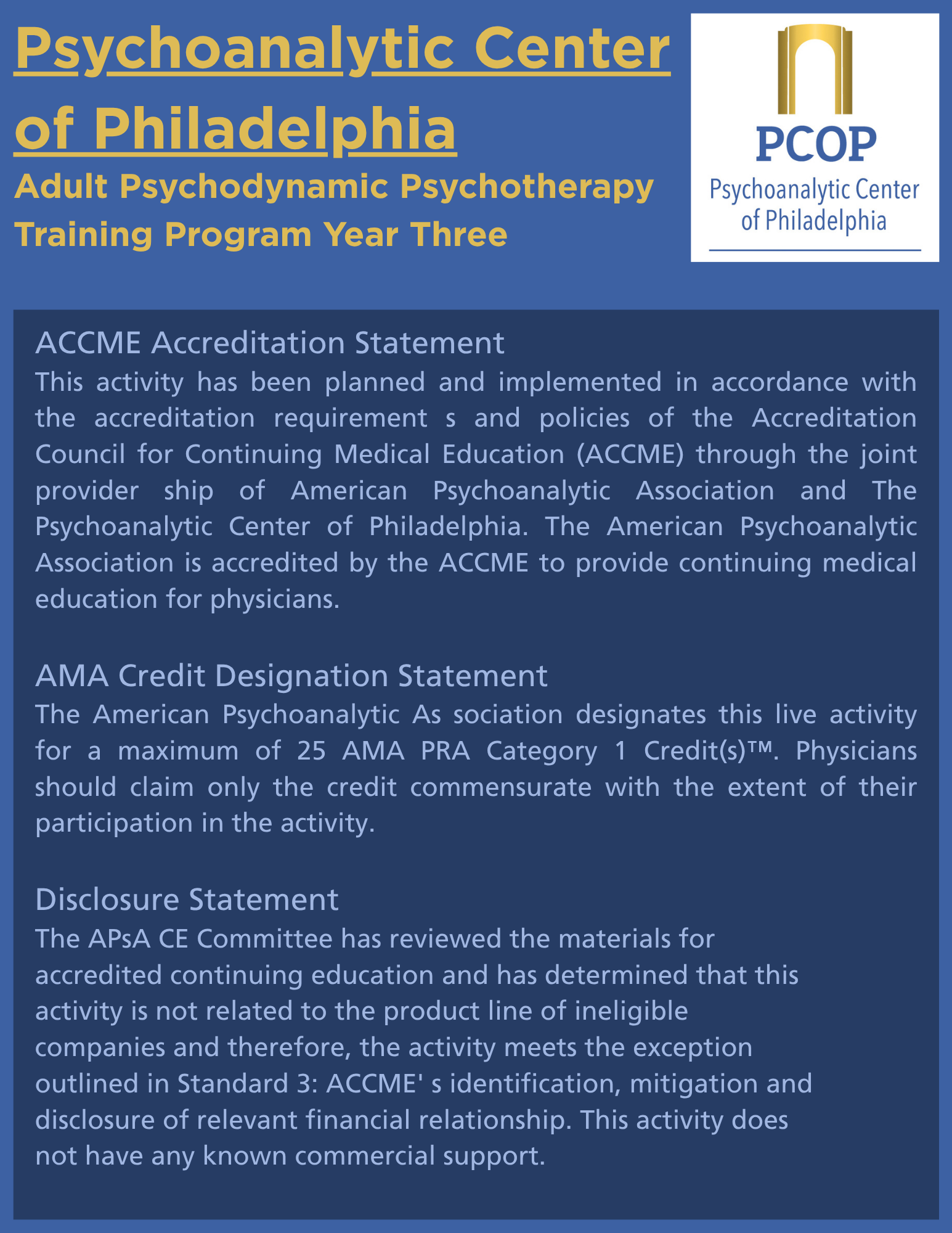
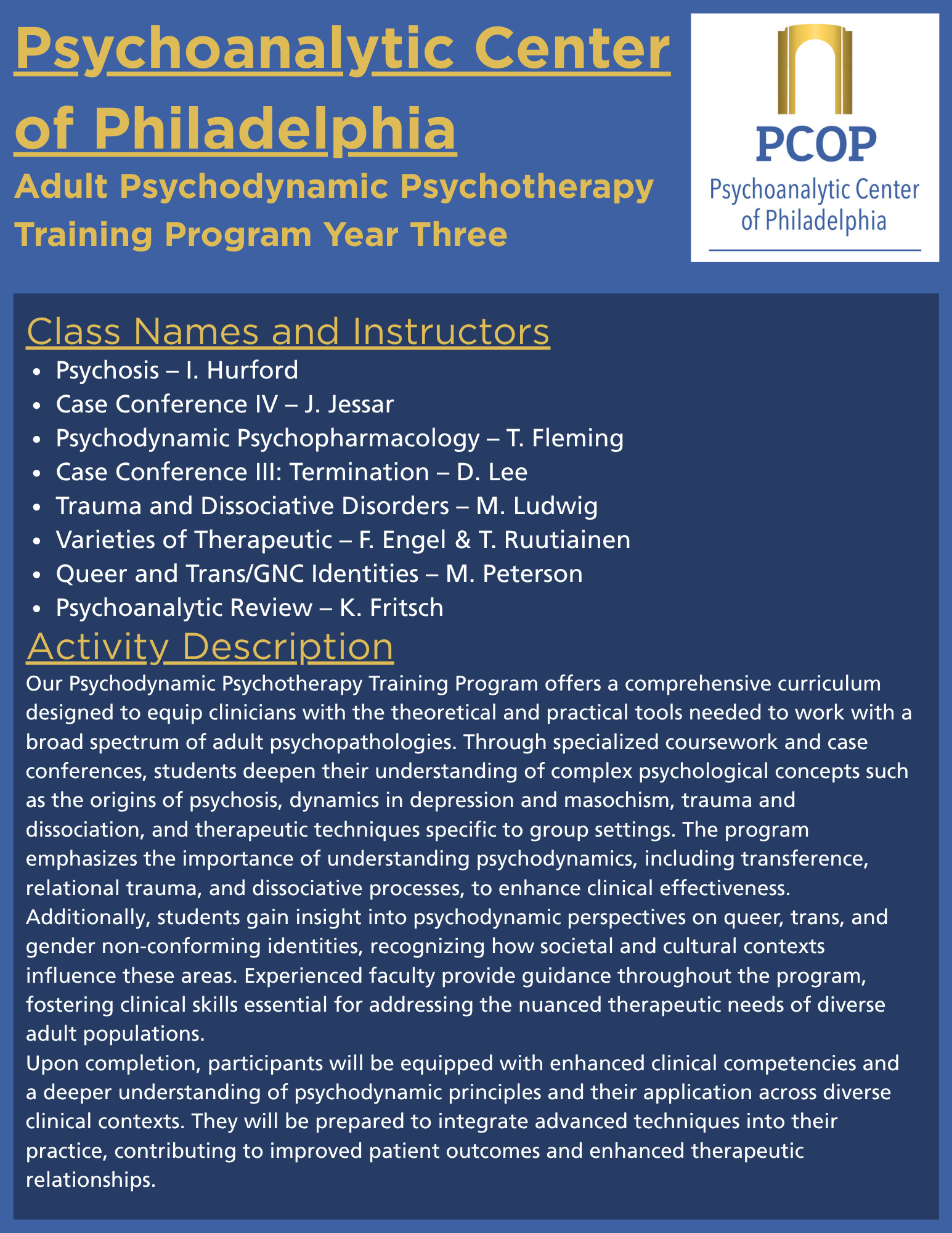   
Adult Psychoanalytic (PsA) Program
The curriculum for training in psychoanalysis is tripartite, including: the personal analysis, supervised clinical work, and didactic seminars. The Center has a well-respected, scholarly faculty that ably conveys the complexity of psychoanalytic thinking today. The didactic curriculum consists of a series of seminars, given weekly over five years, designed to impart a thorough knowledge of psychoanalytic theory beginning with Freud’s discovery of the unconscious mind and encompassing conflict theory, ego psychology, object relations theory, perspectives on narcissism, and relational theory.
The curriculum keeps abreast of contemporary issues such as gender theory, trauma theory, research in child development, and findings in neuroscience. Technique is taught in seminars and in Continuous Case Conferences, in which a single case is followed over the duration of the course. Development from infancy to adulthood is studied in a six-course sequence. Years Four and Five study special topics in Advanced Electives. An active Curriculum Committee reviews courses and explores ways in which new areas of knowledge may be incorporated into the program. Candidate representatives participate as voting members on the Curriculum Committee.
Classes are held virtually, weekly, on Wednesday evenings. Starting and ending times of classes vary from year to year.
All class sessions are one hour and fifteen minutes long, and each session offers 1.25 CE/CME credits. Specific class information (date, time, location, instructor) will be provided to students upon acceptance to the program.
PSA Year 3
Course Title: Advanced Transference & Countertransference
Instructor: Sally Holtz, PhD
Start Date: 9/3/2025
End Date: 10/15/2025
No. of Sessions: 5
Welcome to our class on transference, countertransference, and enactments. In this class I hope we can deepen and broaden our understanding of these psychoanalytic concepts. Each week we will read one article and spend part of the class discussing this article. Please come prepared with comments, questions, and criticisms. In the second part of each class, we will hear sessions from an ongoing analysis. We will discuss this material as we would in a continuous case conference, paying close attention to transference, countertransference, and enactments.
Course Title: Male Psychology
Instructor: Lawrence Blum, MD
Start Date: 9/10/2025
End Date: 10/29/2025
No. of Sessions: 5
-
Participants will learn historical and contemporary views of male development.
-
Participants will recognize signs of castration anxiety in men in everyday life.
-
Participants will understand various paths of male development.
Course Title: Klein & Winnicott
Instructor: Salman Akhtar, MD
Start Date: 10/8/2025
End Date: 11/12/2025
No. of Sessions: 5
At the completion of this course, students will be able to:
-
Enumerate the major theoretical contributions of the renowned psychoanalyst, Melanie
Klein.
-
Enumerate the major theoretical contributions of the renowned psychoanalyst, Donald
Winnicott.
-
Distinguish between the therapeutic approaches of these two analysts.
-
Apply these insights to his or her own work with patients
Course Title: Trauma II
Instructor: Ira Brenner, MD; Richard Kluft, MD, PhD
Start Date: 10/29/2025
End Date: 1/21/2026
No. of Sessions: 10
This course provides an overview of contemporary analytic thinking about trauma, linking it with classical psychoanalytic views, trauma theory, and current psychiatric thinking. There is particular emphasis on such topics as developmental considerations (with an emphasis on attachment), repetition, enactments, reconstruction, traumatic memory, trauma-related disruptions of memory, the intergenerational transmission of trauma, the impact of trauma upon transference and countertransference, dissociative psychopathology, and modifications of technique in response to trauma-related psychopathology. It will discuss the evolution of a trauma-informed, dissociation-inclusive, and hypnotizability/dissociative-sensitive approach to both the understanding and treatment of mixed relational trauma and Criterion A PTSD severe stress trauma that reintegrates elements marginalized in psychoanalytic scholarship and clinical work since the 1890s.
Course Title: Female Psychology
Instructor: Ann Eichen, PhD
Start Date: 11/5/2025
End Date: 12/3/2025; fifth session on 3/4/2026
No. of Sessions: 5
This course examines psychoanalytic understanding of female psychology beginning with Freud's initial formulation and noting modifications and innovations within the framework of psychoanalytic theory. Recent contributions from direct infant observation are discussed.
Course Title: Reflection Group
Instructor: Sonja Ware, ThM, MDiv
Start Date: 11/19/2025
End Date: 5/27/2026
No. of Sessions: 4 (spread across the year)
Course Title: Listening II
Instructor: Jed Yalof, PsyD
Start Date: 12/3/2025
End Date: 1/14/2026
No. of Sessions: 5
Freud’s (1981/1912) recommendation to physicians: “To put it in a formula: he must turn his own unconscious like a receptive organ toward the transmitting unconscious of the patient. He must adjust himself to the patient as a telephone receiver is adjusted to the transmitting microphone. Just as the receiver converts back into sound-waves the electric oscillations in the telephone line which were set up by sound waves, so the doctor’s unconscious is able, from the derivatives of the unconscious which are communicated to him, to reconstruct that unconscious, which has determined the patient’s free association.” (pp. 115–116)
Welcome! Freud’s classic description of psychoanalytic listening tells us that a psychoanalyst cannot listen to a patient without listening to themselves. Advanced listening requires an open-minded attitude in which different organizing concepts and strategies for listening inform the analyst’s interventions. In this course, we will cover several dimensions that highlight an integrative approach to psychoanalytic listening.
Course Title: Racism & Otherness
Instructor: Samuel Wyche, DO
Start Date: 12/10/2025
End Date: 3/18/2026
No. of Sessions: 11
This course will address discrimination on the basis of race, creed, color, sex, age, national origin, handicap, or sexual preference.
Course Title: Developing Cases
Instructor: Diana Rosenstein, PhD
Start Date: 1/21/2026
End Date: 2/25/2026
No. of Sessions: 5
The purpose of this course is to help students expand their psychoanalytic practice by developing psychoanalytic cases. We will explore the literature both on how to develop cases through deepening the treatment, as well as the impediments, both reality-based and countertransferential, to increasing a psychoanalytic case load.
Course Title: Interpreting Dreams II
Instructor: Bruce Levin, MD
Start Date: 2/4/2026
End Date: 3/11/2026
No. of Sessions: 5
We will read a series of classic papers on dreams including a portion of Sigmund Freud’s book The Interpretation of Dreams highlighting one of the most famous dreams, the Irma Dream. We will use clinical material to discuss different types of dreams and how to analyze them.
Course Title: Adult Development and Aging
Instructor: Ann Eichen, PhD & Patricia Boguski, MA, LPC
Start Date: 3/11/2026
End Date: 4/15/2026
No. of Sessions: 5
This course will explore the psychological aspects of development across the adult life span. We will seek to understand the unique nature of adult development by considering the specific tasks and challenges that arise from young adulthood through very old age. We will explore how the unique developmental tasks in adulthood might guide our understanding of and work with our adult patients in the context of their particular stage of life.
Course Title: Psychoanalytic Writing
Instructor: Mark Moore, PhD
Start Date: 4/1/2026
End Date: 4/29/2026
No. of Sessions: 5
The central aim of this course is to encourage you to use writing as a way to reflect on your work with patients, to slow down and notice more, and to disentangle some of the complexities of the clinical moment. As it is also your first writing course as analytic candidates, I hope to show how important writing is to the development of your analytic identity, as you learn to find and express your own unique voice.
For this course, be prepared to write about and present material from ongoing analytic cases if possible, or from current therapy cases that you expect may eventually become analytic treatments. Also, the course will be more useful if you can write about the same patient each week. While we will briefly discuss the readings, I have included them primarily as an aid to your writing; so make sure to focus most of your time and effort on the writing assignments.
However, as the reading for this course is light, I do expect you to complete the short writing exercises, as they will form the core of the material that we will discuss each week. The weekly writing assignments are never more than 1-2 pages in length, and note that they are intended to be first drafts. Focus on getting your thoughts and impressions on the page; edits and corrections can always be made later. However, always read over what you have finished at least once, and preferably aloud. Listen for where it ceases to make sense or sounds awkward or stilted. That can indicate a need to rewrite that section, or to wonder about the shift in your writing.
As a group we will be focusing on each other’s writing. To share our writing with others can leave us feeling exposed and open to criticism. This is especially true of writing about analytic work that is deeply intimate, complicated, and messy. To ensure we all feel comfortable sharing our work, we will avoid “supervising” each other’s clinical work, strive to be curious rather than critical, and not presume to know better. Instead, we will aspire to read in a spirit of playfulness, compassion, and appreciation. And if we’re fortunate, we may also learn to write in that same spirit.
Course Title: Adult Continuous Case Conference
Instructor: Sally Holtz, PhD
Start Date: 4/1/2026
End Date: 6/10/2026
No. of Sessions: 10
The central aim and focus of this continuous case is to learn from the case material, learn from each other and to share our analytic ideas, approaches and views. The case will be a springboard for discussion. The overarching theme will be looking at the material from many different facets.
At the completion of this course, students will be able to
-
Prepare psychodynamic formulations based on clinical material.
-
Explain the purpose behind interventions made in psychoanalytic sessions.
-
Describe the nature of resistance that arises during psychoanalytic therapy.
-
Compile examples of transference and countertransference occurring in a psychoanalytic session.
Course Title: Object Relations II
Instructor: Anne T Malone, MSS, LCSW
Start Date: 5/6/2026
End Date: 6/10/2026
No. of Sessions: 5
In Object Relations II we will look at dimensions of how Object Relations further evolved. After both Melanie Klein and Anna Freud came to London, there was great controversy between them {the Controversial Discussions). A Middle Group emerged that was neither Kleinian nor purely Anna Freudian (Ego Psychological). The writers from ORI (except Klein) were all in this group and had varying concerns. Fairbairn argued directly that libido was, from birth, object seeking and elaborated theory growing from this. Bowlby developed attachment theory from an ethological perspective. Winnicott never broke openly with either group but developed theories unique to his clinical observations that stress the emergence and empowerment and creativity of the self.
All the theorists we are reading in this course focus on the earliest experiences of the infant as profoundly formative. Labeling these as “preoedipal” (as Ego Psychologists do) assumes that the Oedipal Complex is the given and defining moment for all. This is often questioned indirectly in these formulations.
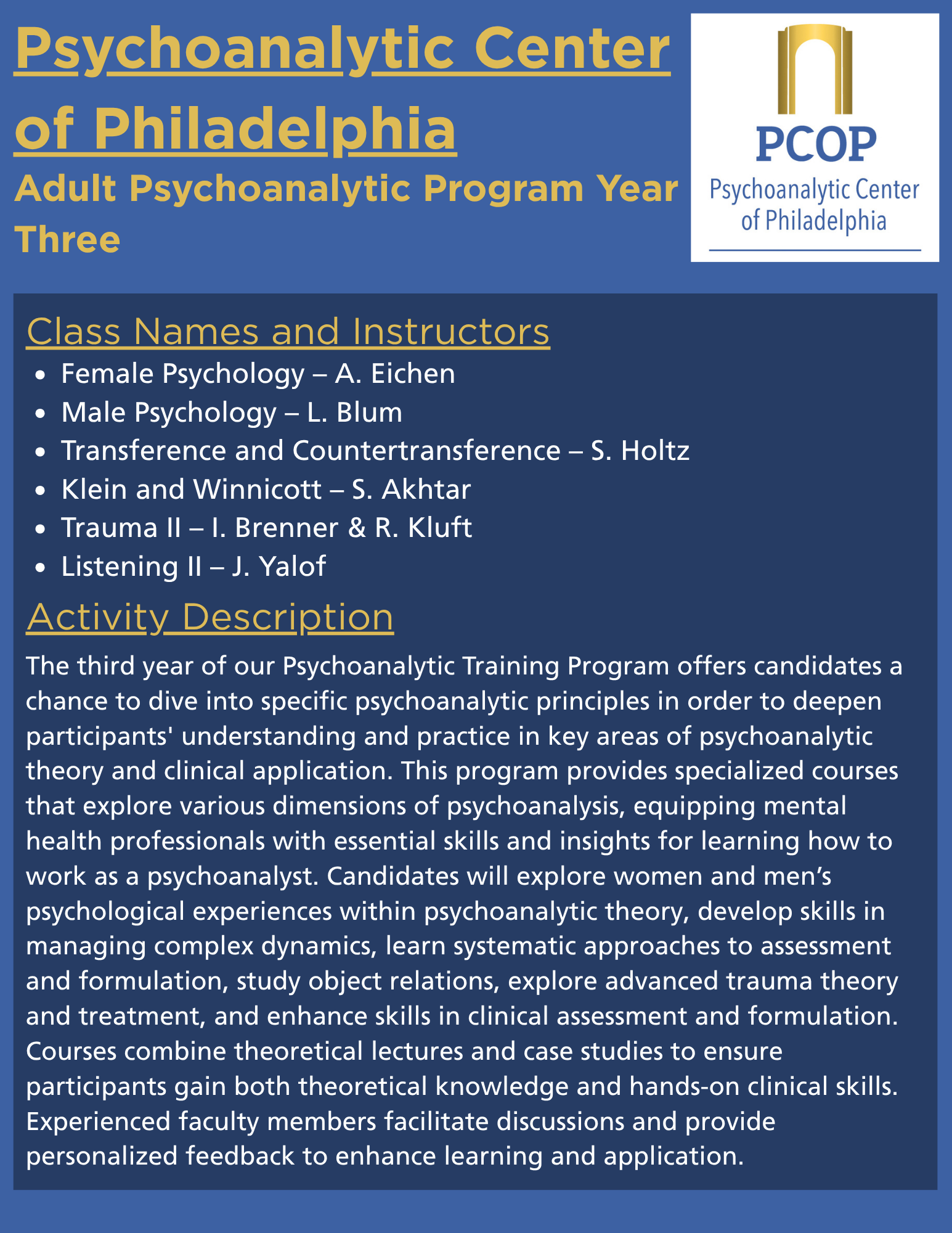 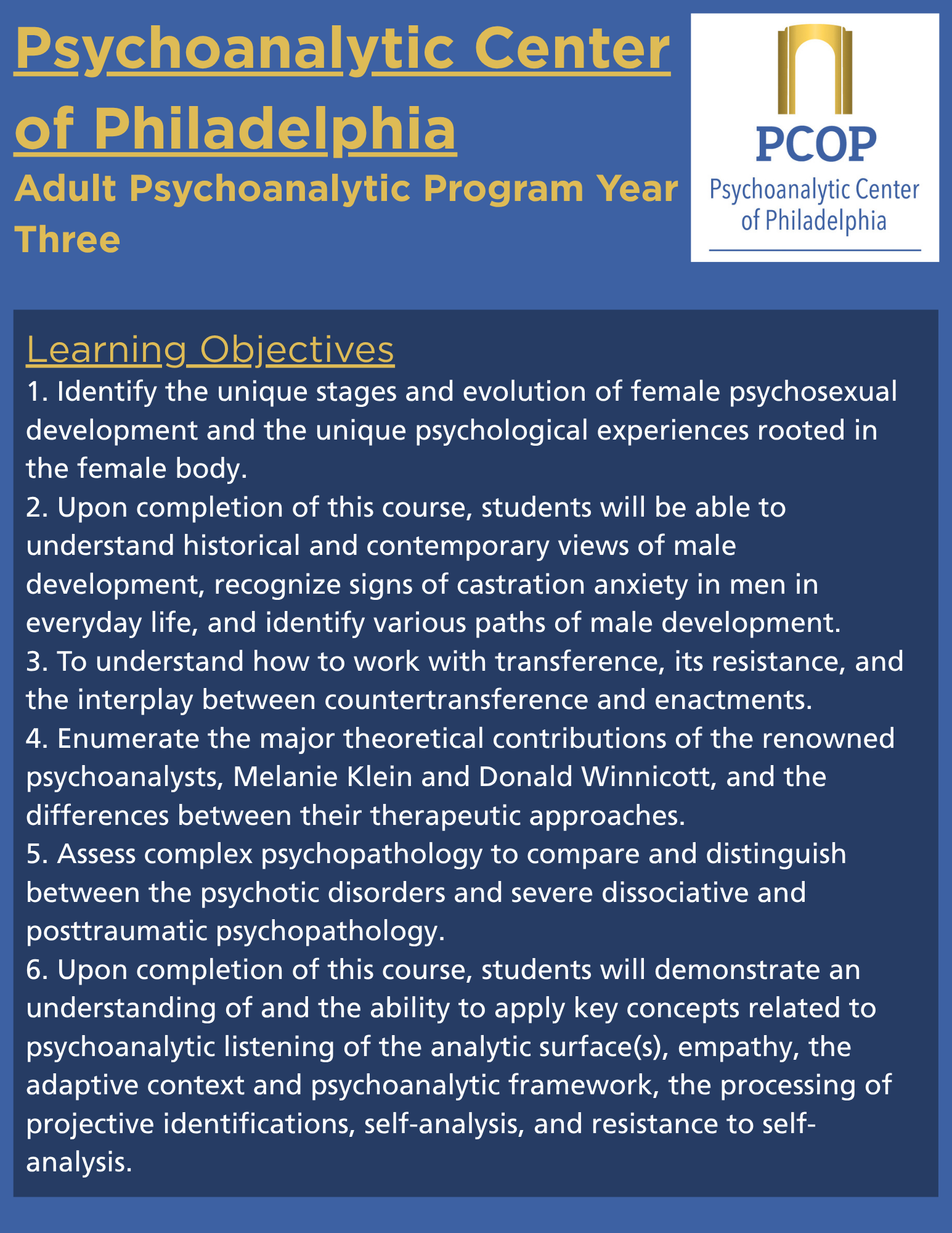 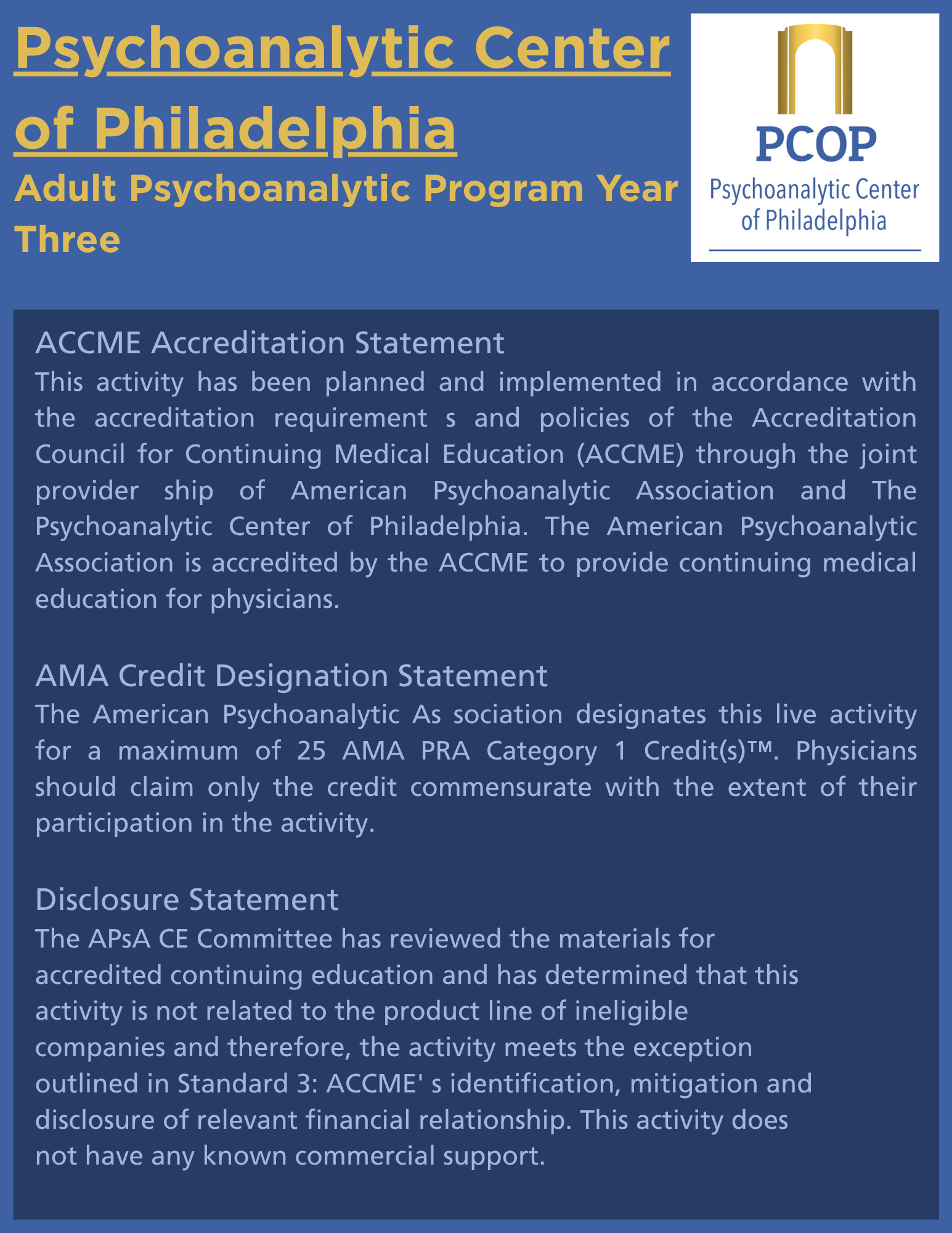
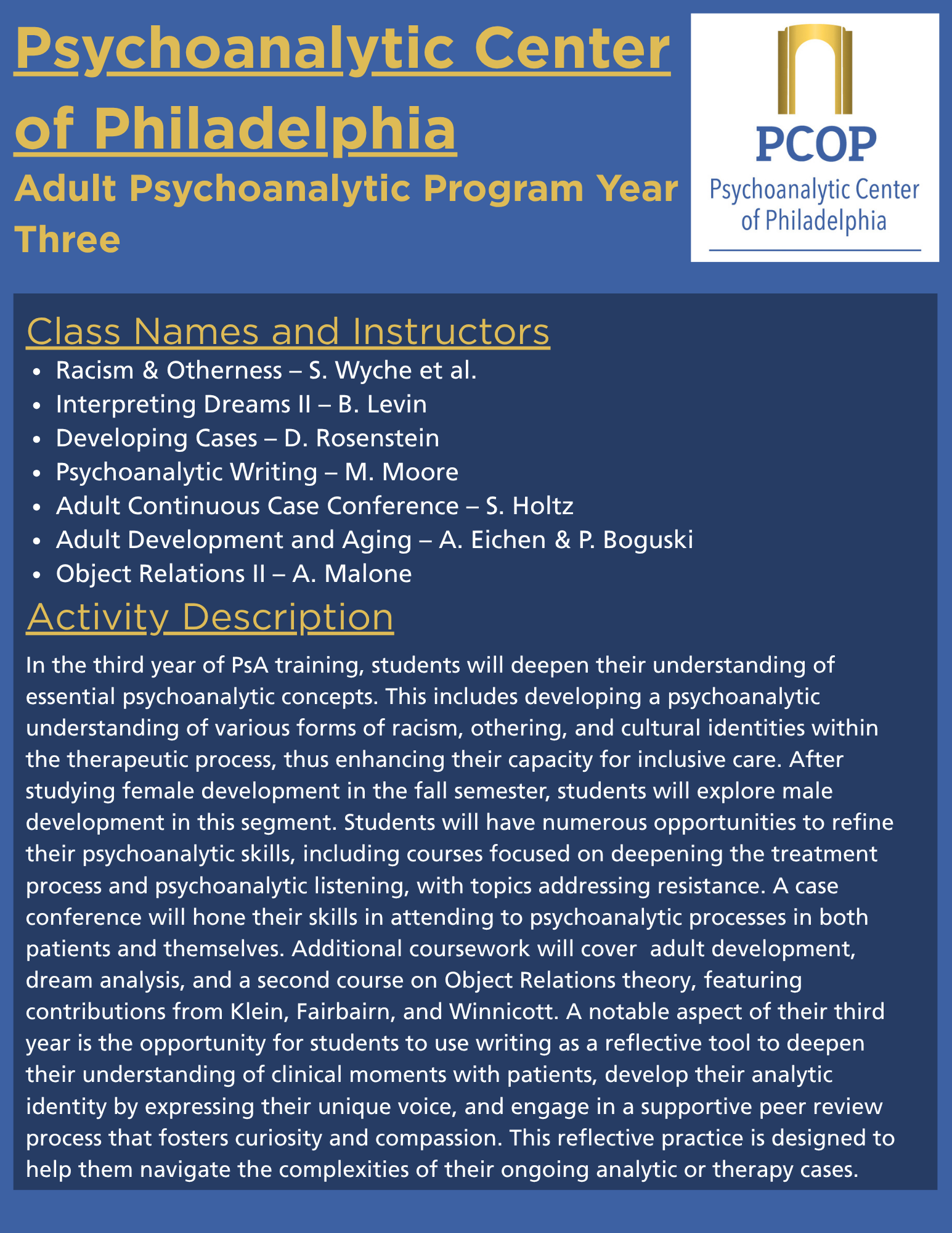 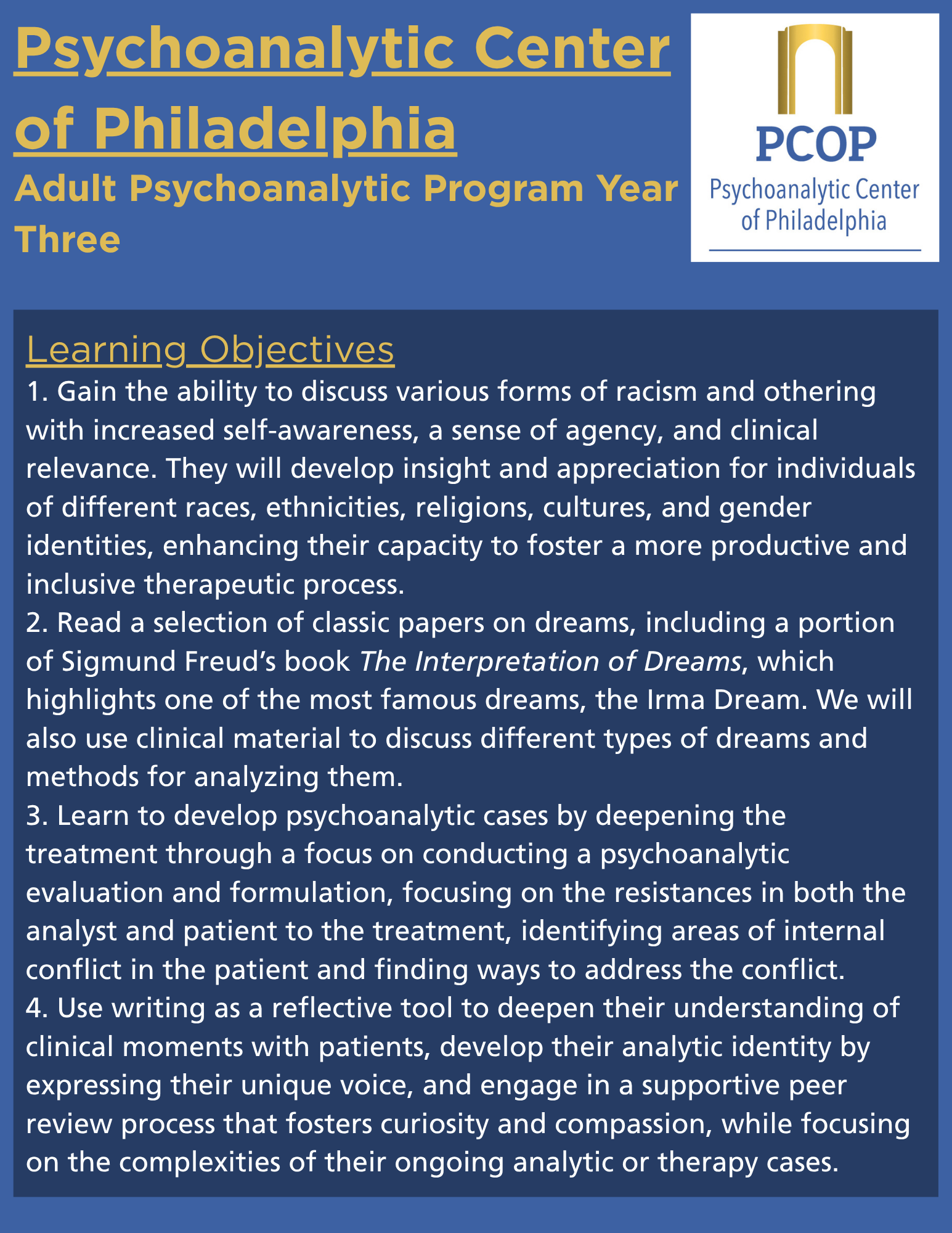 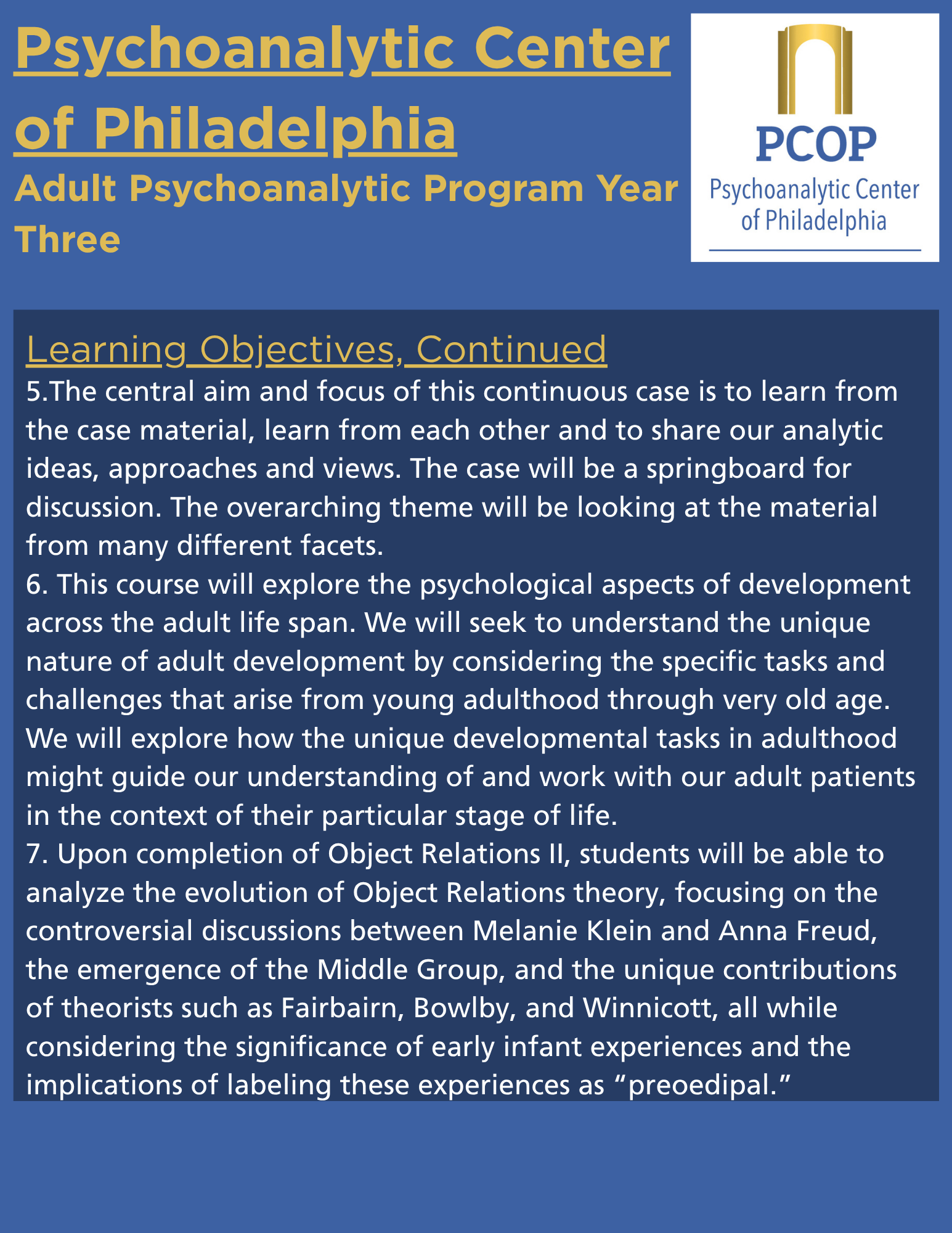 
PSA Year 4
Course Title: Intersubjectivity
Instructor: Suzanne Benser, MD
Start Date: 9/3/2025
End Date: 10/29/2025
No. of Sessions: 5
The current course will build on the concept of the analytic third as we discussed in the work of Benjamin, and more recent courses that covered papers by Melanie Klein, Donald Winnicott, Thomas Ogden, and your introduction to the work of Wilfred Bion. The work of these innovators has evolved the two-person interpersonal psychology to a view of the psychoanalytic situation as an analytic field that encompasses the subjectivities of both patient and analyst where each is implicated in its co-construction- but are also formed by the field. We will also be reading work by Diane Elise who connects this turn back to our original foundation of the body ego, libido, and infantile sexuality by considering the erotic dimensions of the analytic field. This intersubjective view of psychoanalysis shifts the view of therapeutic efficacy from processing or uncovering historical object relational internalizations and conflicts to the potential expansion of psychic processes that allow for the emergence of authenticity, creativity and meaning. All of the readings are an opportunity to appreciate both the complexity and the ineffable aspects of psychic reality.
Course Title: Depression
Instructor: Ralph Fishkin, DO
Start Date: 9/3/2025
End Date: 10/29/2025
No. of Sessions: 5
At the completion of this course, students will be able to summarize and critique the classical and more recent psychoanalytic theories of the Depressions. Describe and compare the various clinical manifestations of depression, including its characteristic symptoms, character traits and dynamics. Study the clinical techniques necessary to address these manifestations of depressed adults and children by psychoanalytic treatment. Differentiate normal from pathological mourning and compare and contrast the various treatment techniques that have been shown to be effective for varieties of pathological mourning. Summarize the factors that contribute to suicide; enumerate the clinical signs of impending suicide; learn about interventions for suicide prevention and the treatment of suicidal patients; and discuss the effects of suicide on the therapist.
Course Title: Representations of Sexuality in Psychoanalytic Process
Instructor: Melvin Singer, MD
Start Date: 11/5/2025
End Date: 12/17/2025
No. of Sessions: 5
At the completion of this course, students will be able to
-
Awareness of defensive use of derivatives of sexual fantasies that are first represented in the associative material as forms of resistances that gradually give way to the more actual primal fantasies originating in the oedipal period. This can take the form of language usage, interpersonal relatedness, bodily symptoms, and physical gestures, etc.
-
Differentiate the different forms, levels, and primitivity of sexual fantasies as revealed in neurotic and borderline patients with perversions.
-
For example, a borderline patient may initially reveal very explicit sexual fantasies of an apparent genital nature only to be concealing primitive oral libidinal and early object attachment deficits and defects; whereas, a neurotic patient could present at first dependent attachment issues, which defensively are concealing higher-level oedipal and castration issues.
Course Title: Advanced Psychoanalytic Process
Instructor: Harvey Schwartz, MD
Start Date: 11/5/2025
End Date: 12/17/2025
No. of Sessions: 5
The Psychoanalytic Process is the bedrock of our clinical work. It is what we look for in defining psychoanalysis, cure, graduation and certification. At the same time it is an elusive concept – inter-rater reliability is weak though the stridency of various proponents is strong. We will be studying and comparing different authors’ views of the psychoanalytic process and noting how it relates to their theories of cure.
Course Title: The Social Unconscious
Instructor: Sonja Ware, ThM, MDiv
Start Date: 1/7/2026
End Date: 2/11/2026
No. of Sessions: 5
In this course, we are going to take on Dorothy Evan Holmes’ call to articulate the various ways in which we internalize our community at large. The classical Freudian/object relational/self psychological models have lacked sufficient explanatory power for this endeavor. Some relational and intersubjective writers use concepts that move in the direction of conceptualizing a social unconscious- an idea derived in part from neighboring fields of group psychoanalysis/group dynamics and social science. Ogden and Benjamin’s concepts of an analytic third bring the dyad into a “small group” in relation to a third. The many field/interpersonal theories in psychoanalysis, by Sullivan, Ferro, and others, look at the individual in a social context, but focus on what the individual projects onto the field.
Course Title: Master Series: Interpretation
Instructor: TBD
Start Date: 1/7/2026
End Date: 3/25/2026
No. of Sessions: 10
Course description coming soon.
Course Title: Deepening the Treatment
Instructor: Jill Ragozzino McElligott, LCSW
Start Date: 2/18/2026
End Date: 3/25/2026
No. of Sessions: 5
Course Title: Varieties of Sexual Orientation
Instructor: Ilene Dyller, PhD
Start Date: 4/1/2026
End Date: 4/29/2026
No. of Sessions: 5
This class is intended as an introduction to the varieties of sexual and relational orientation we encounter in our practices. We will begin with heterosexuality and consider some of the developmental factors that often get ignored with heterosexual patients and some of the variety that exists in heterosexual experience. We will spend the next several class sessions thinking about homosexuality—developmental experiences of children who are growing up gay, our discipline’s history (lasting into the present) of pathologizing homosexuality, the intersection of gender and homosexuality, internalized homophobia, and the experiences of both straight and LGBTQIA analysts working with the transference-countertransference with both straight and LGBTQIA analysands. In our last class session we will speak about bisexuality and non-monogamy (the latter better conceptualized as a relational orientation than as a sexual one) and how our field has, and more often has not, considered these topics.
Course Title: Adult Continuous Case Conference
Instructor: Frederic Baurer, MD
Start Date: 4/1/2026
End Date: 6/10/2026
No. of Sessions: 10
A candidate will present process material from an analytic case on a weekly basis. Readings may be assigned as needed on topics which come up in the discussion. At the completion of this course, students will be able to discuss assessment of the ongoing analytic process and consider three relevant techniques applicable to the case. Candidates will identify two examples of transference and countertransference in the material presented and discuss how to work with them.
Course Title: Independent Study
Instructor: Jeremy Elkins, PhD
Start Date: 5/13/2026
End Date: 6/10/2026
No. of Sessions: 5
At the completion of this course, students will be able to:
-
Develop a topic for independent research;
-
Hone their research skills;
-
Synthesize in writing some of the literature on their chosen topic.
 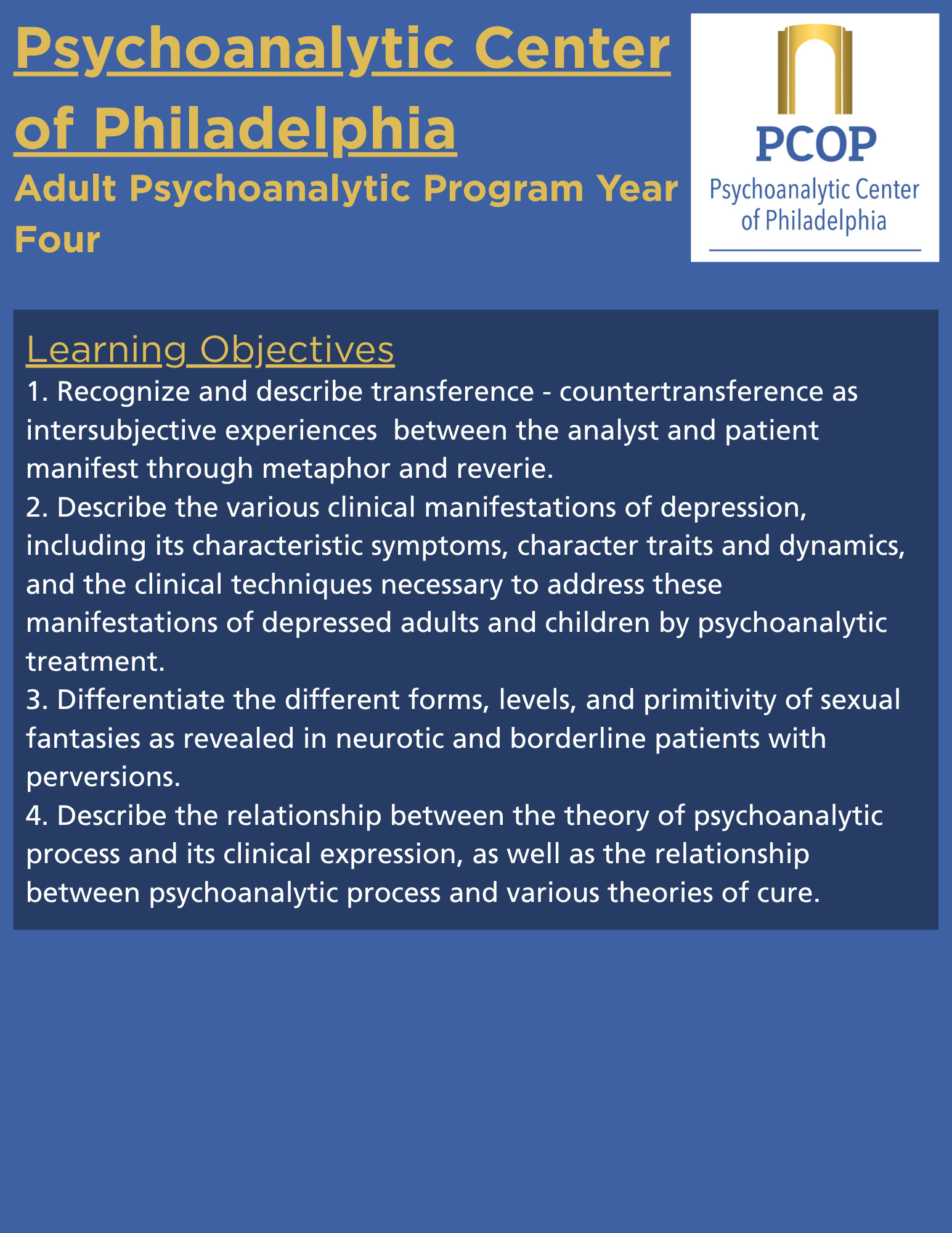 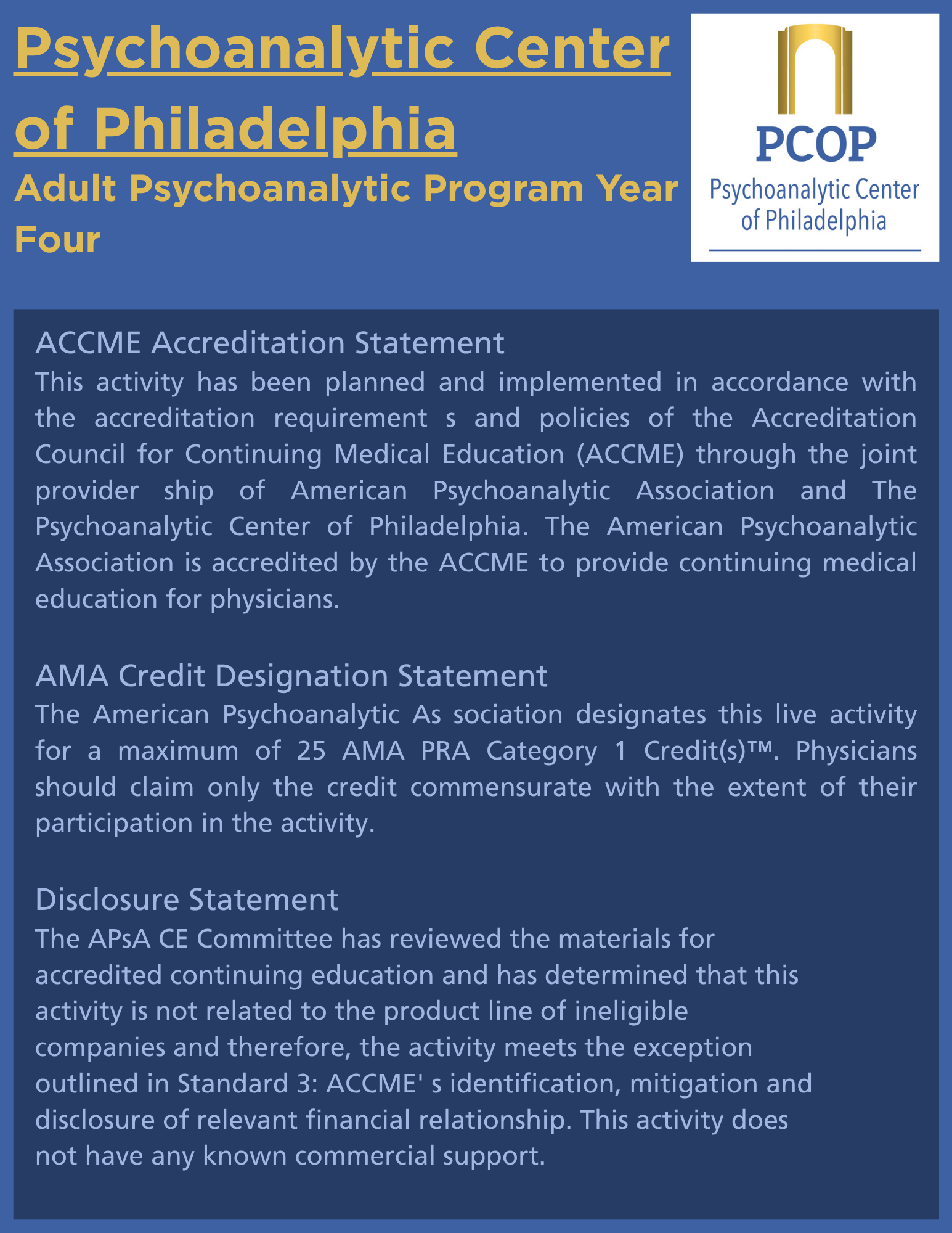
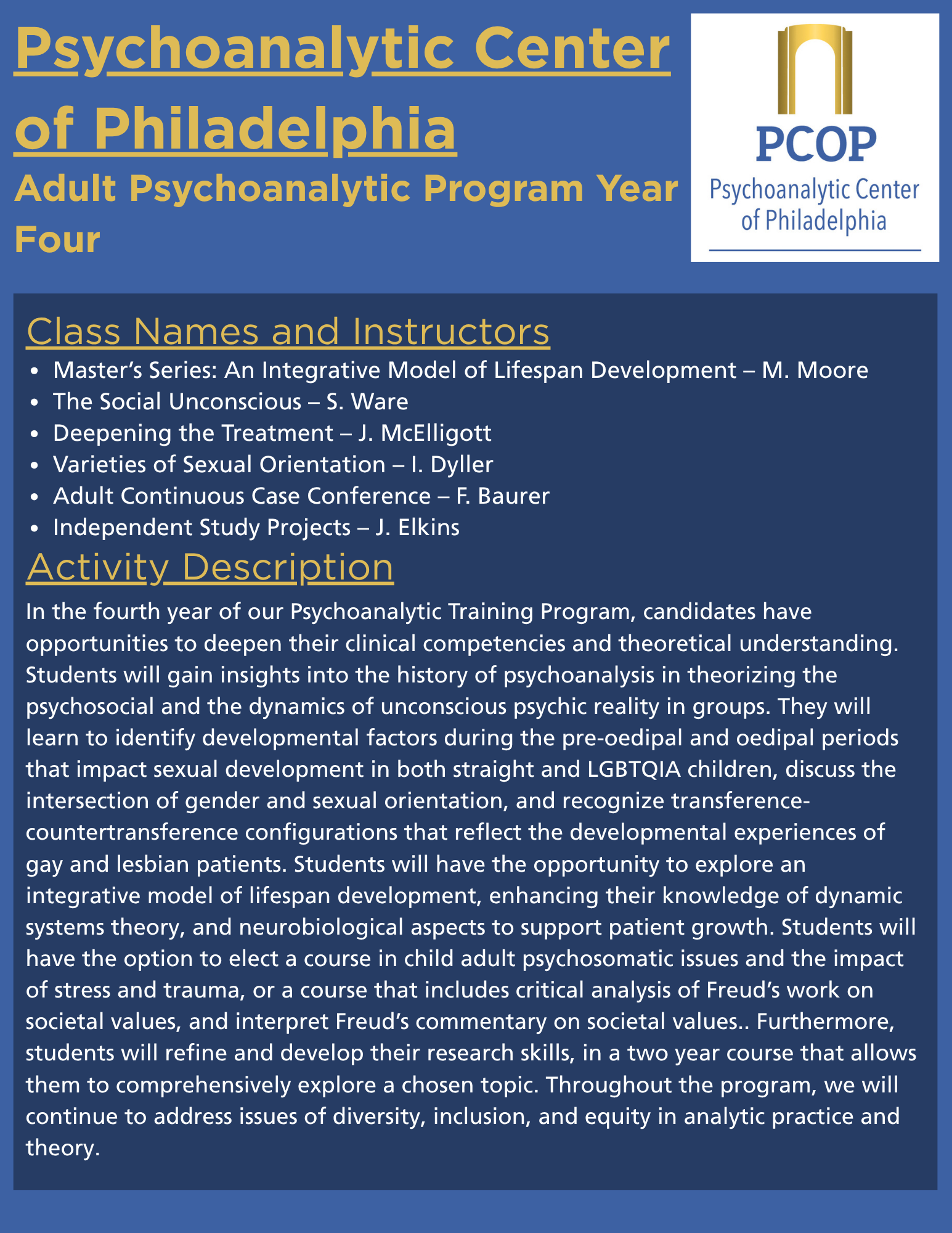 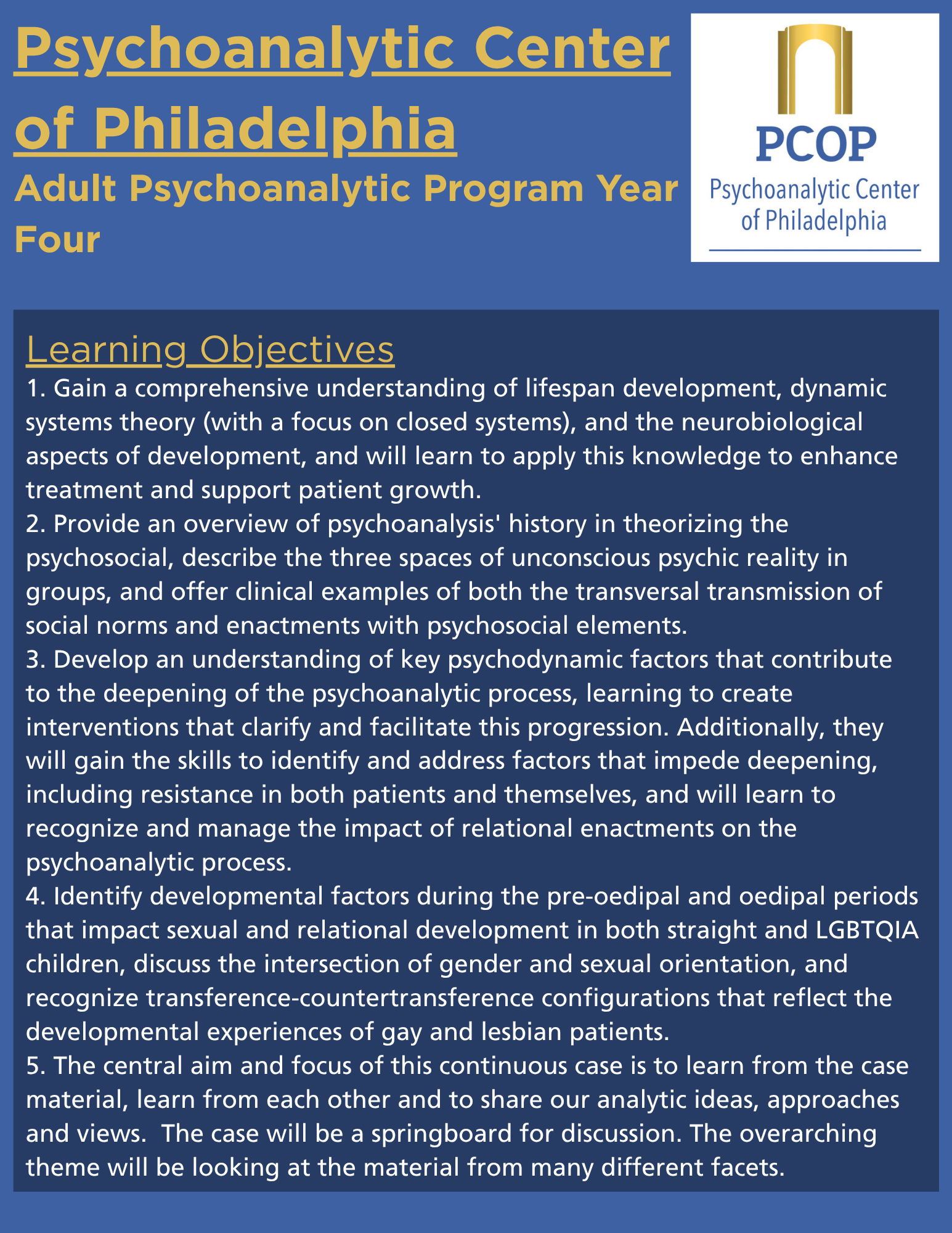 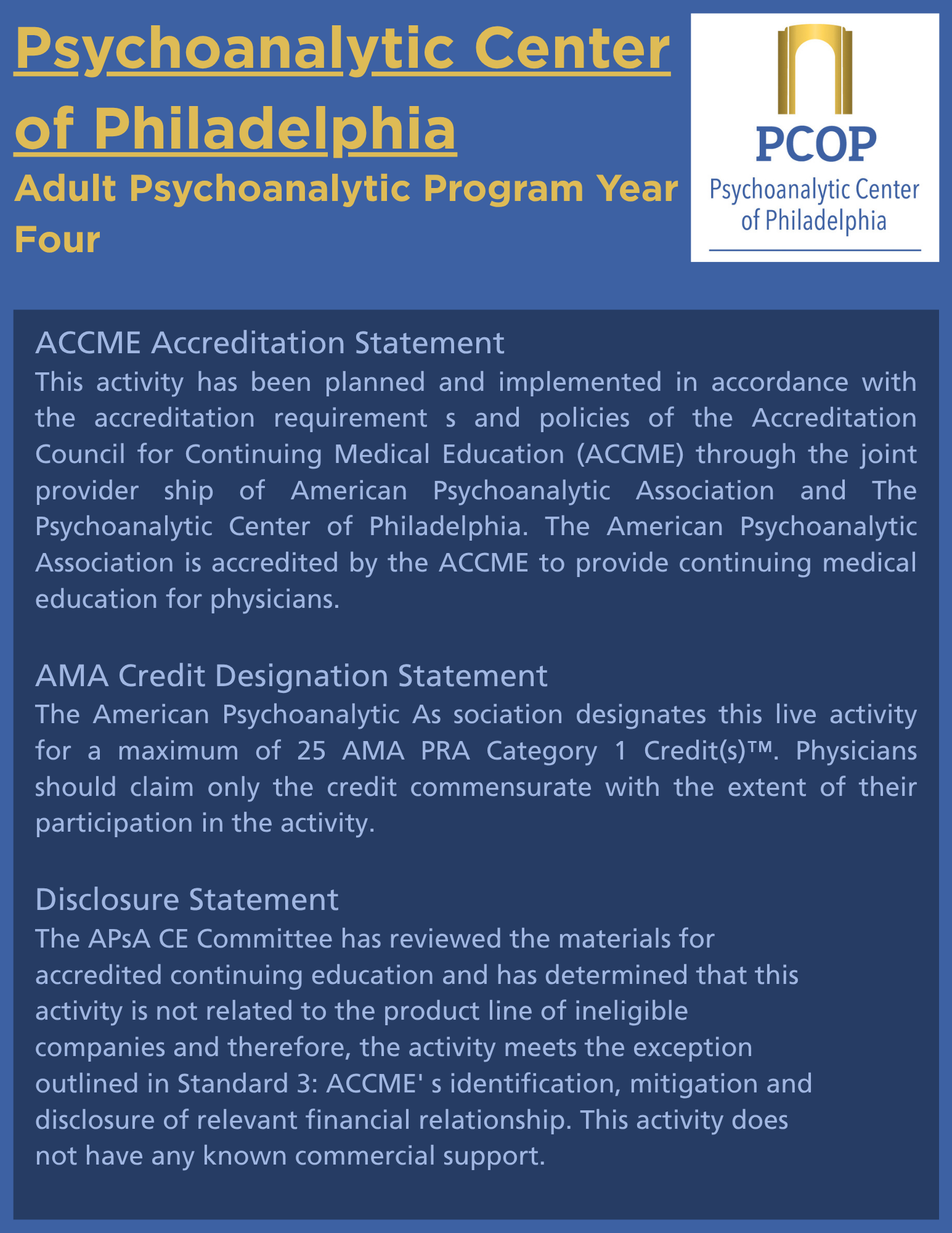
PSA Year 5
Course Title: Varieties of Therapeutic Action
Instructor: Behdad Bozorgnia, MD, MAPP
Start Date: 9/3/2025
End Date: 12/10/2025
No. of Sessions: 10
This course attempts to answer a simple question regarding psychoanalytic treatment: how does this work? The purpose of this course is to familiarize students with various perspectives on therapeutic action in psychoanalysis and psychoanalytic psychotherapy in the hopes of allowing students to elaborate and articulate their own philosophies of therapeutic action. The class will follow a structure of 1) understanding theoretical concepts 2) understanding how these concepts are used (as technique) by experts in the field and 3) examining how our understanding and application of theory may be similar or different from the ideas presented. We will survey perspectives on therapeutic action from the major schools of contemporary psychoanalysis including: ego psychology, object relations, self-psychology, and relational psychoanalysis. We will apply each perspective to actual clinical material from case histories in order to see how theory translates or fails to translate into specific forms of technique. Through clinical application we will interrogate how theories of therapeutic action (how psychoanalytic therapy is supposed to work) may correspond or differ from our actual intended therapeutic actions (how we actually practice psychoanalytic therapy). In doing so, we will create the foundation for a creative dialectic between theory and practice, which will render theory more realistic but also render our practice more considered and yet flexible. Objectives through reading are to describe the defining features of therapeutic action as described by ego psychology, object-relations, self-psychology, and relational psychoanalysis. Understand the similarities and differences regarding therapeutic action for each school. Practice translating theories of therapeutic action into different therapeutic techniques. Articulate your own theory of therapeutic action and understand how this theory implicitly and explicitly influences your technique with patients.
Course Title: History of Psychoanalysis
Instructor: Anne T Malone, MSS, LCSW
Start Date: 9/3/2025
End Date: 12/17/2025
No. of Sessions: 11
This course is designed to be an introduction to psychoanalytic theories and also to provide references to consult for future classes.
Ideally, each of us develops a personal map of theory over a lifetime. Candidates will be introduced to others' maps and will develop an individualized way to track their own learning. This toolbox may be modified and expanded through candidacy and beyond.
Course Title: Elective, Adult: Teaching Psychoanalysis
Instructor: Mark Moore, PhD
Start Date: 12/17/2025
End Date: 2/4/2025
No. of Sessions: 5
Course description coming soon.
Course Title: Master Series: Interpretation
Instructor: TBD
Start Date: 1/7/2026
End Date: 3/25/2026
No. of Sessions: 10
(Same as PSA Year 4.)
Course Title: Elective: Child/Adult: Psychosomatic Phenomena in Infants, Children, and Adolescents
Instructor: B. Shapiro
Start Date: 2/11/2025
End Date: 3/18/2026
No. of Sessions: 5
In this course we will discuss various psychosomatic phenomena occurring in infants, children, and adolescents. The areas of focus will include the impact of the neonatal intensive care unit; repeated painful procedures; chronic pain and somatization in children; various conditions of devitalization, despair, and hopelessness; uses of the body such as tattoos and diabulemia; and sociocultural factors. We will present cases and discuss therapeutic approaches.
Course Title: Writing Workshop
Instructor: Susan Levine, LCSW, BCD, FABP
Start Date: 4/1/2026; intro course on 1/21/26
End Date: 4/29/2026
No. of Sessions: 5 (6, with introduction)
The goal of this course is to continue the process of learning to write psychoanalytically about psychoanalysis. Previous writing courses included (among other things) concepts of formulation, describing the patient, creating your own voice, how to write about clinical material using the experiencing-reflecting-transition model, and how to address the need to include required information in a report without extinguishing the life from the analytic dyad in the process. This is a challenge, to say the least.
This course will focus on narrative style––how you express the content. The more confident you are in your ability to write, the freer you will be to express complex and nuanced concepts and to include your own responses to the patient in the report. I will introduce you to the manner in which literary writers commonly workshop their drafts. I have been writing and publishing solely fiction since 2016, after having published various psychoanalytic articles as well four volumes (two single authors, two edited). I hope this new approach to case writing will be useful.
Some of you may not have had an analytic case previously, some of you may have already written numerous initial reports and updates. This does not matter! Please do not feel intimidated if you are not an experienced psychoanalytic writer. You are, by this time, an experienced psychoanalytic reader. And if you have written many reports, you know, no doubt, that writing can always be improved. One of the best ways both to learn to write and to learn how to revise your work is to become an editor yourself. To paraphrase President Obama, you are the people you have been waiting for!
Course Title: Independent Study
Instructor: Jeremy Elkins, PhD
Start Date: 5/13/2026
End Date: 6/10/2026
No. of Sessions: 5
(Same as PSA Year 4.)
 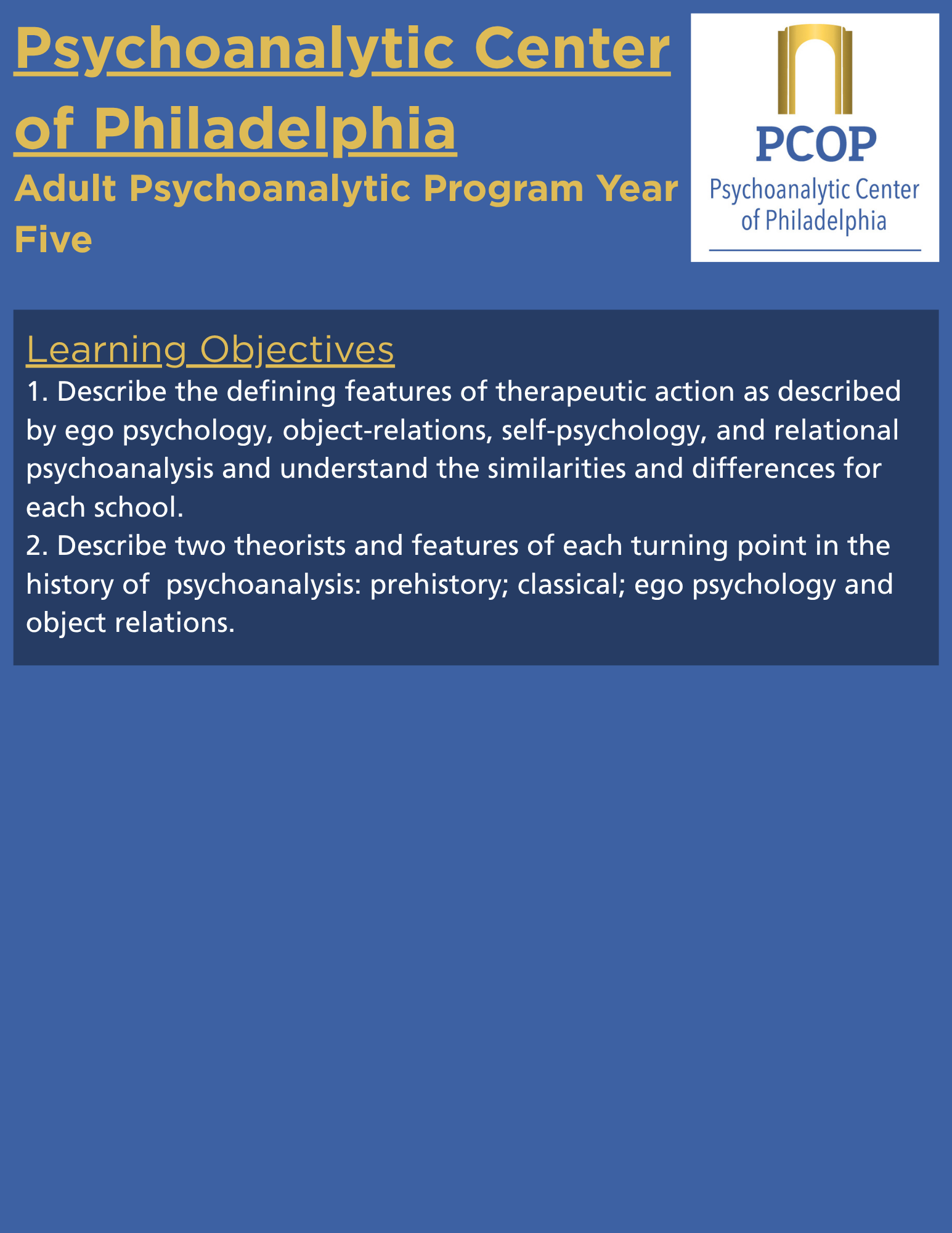 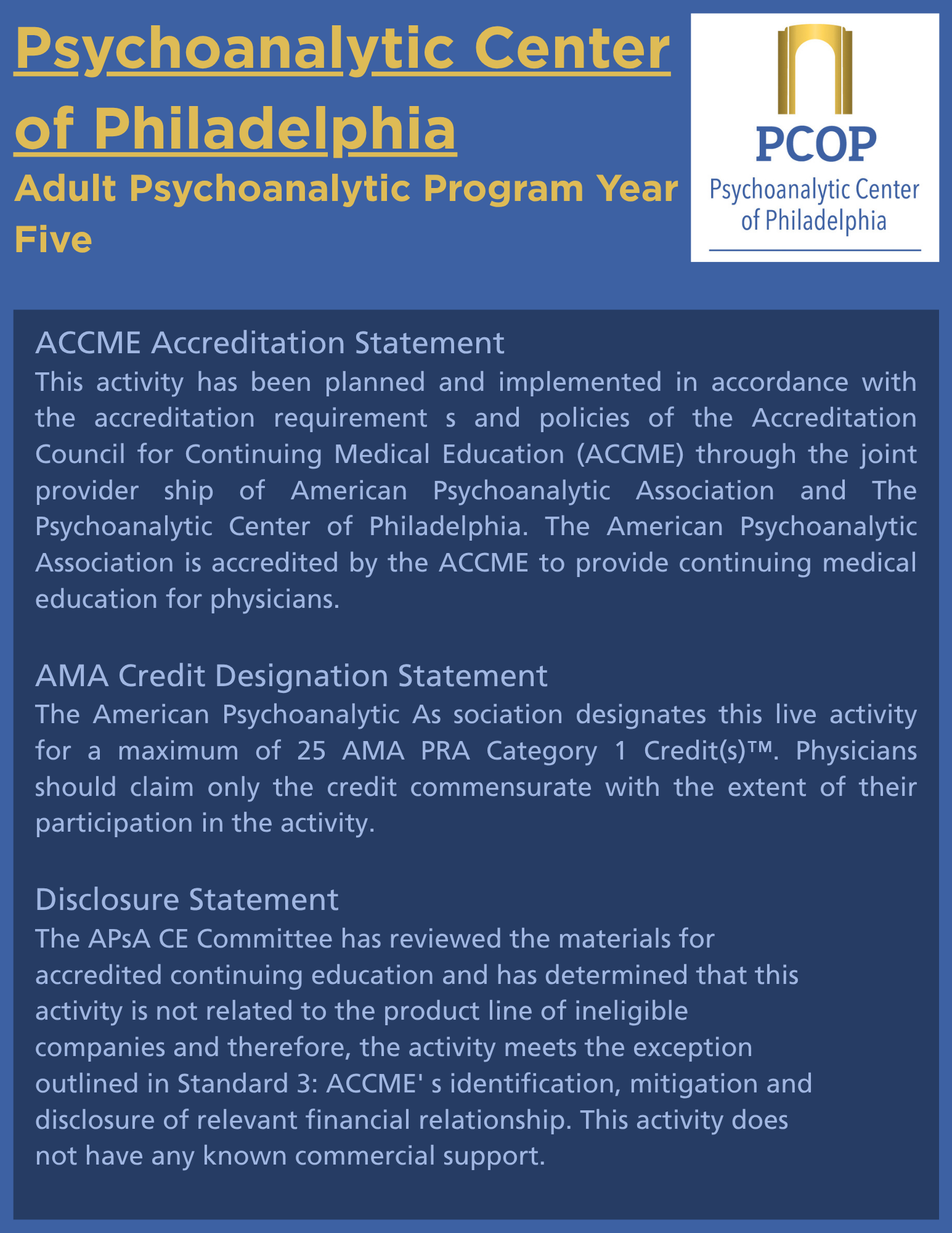  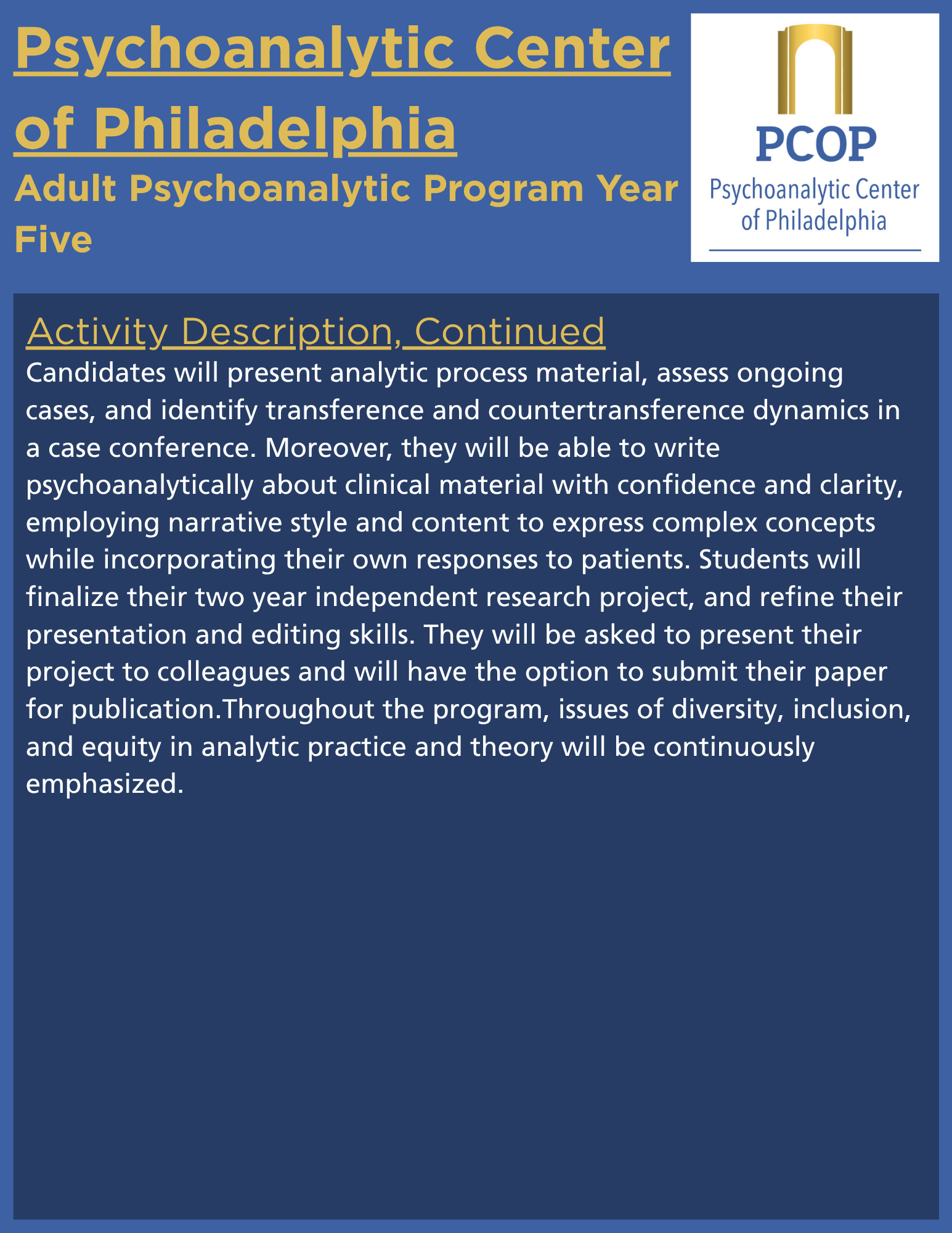 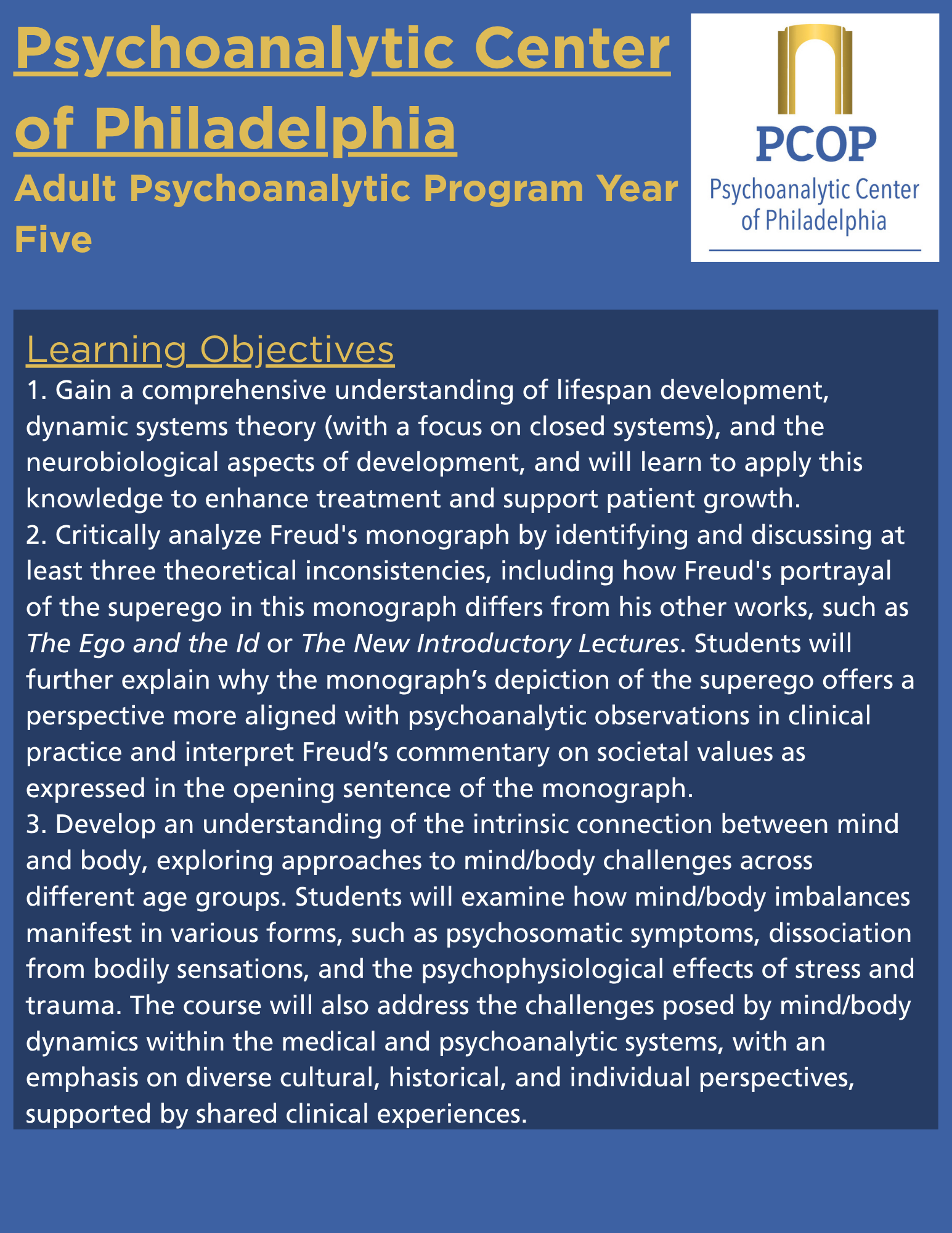  
|